Chat With Us
Call us +1 888 211 8005
- Our Services
- Testimonials
- Resources Blog Thesis topics What is Writing tips Facts
Chat With Us 1(888)958-6528

How to write Evaluative Thesis
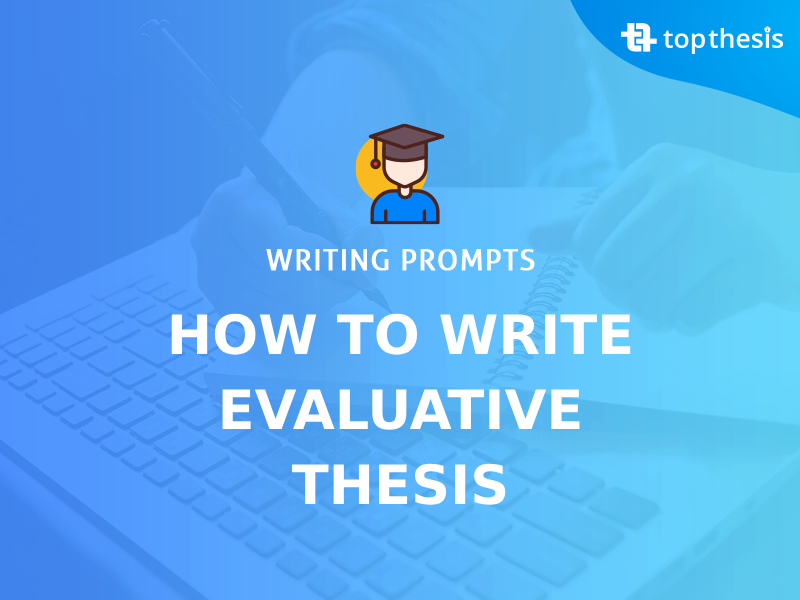
September 5 2023 03:02 PM
- Next >>
In the realm of academic writing, the thesis statement reigns supreme. It serves as the North Star, guiding writers and readers through the complex terrain of ideas and arguments. A well-crafted thesis statement can distinguish between a compelling, thought-provoking essay and one that leaves the audience bewildered or unengaged. Among the various types of thesis statements, the evaluative thesis is a testament to the writer's ability to critically assess and form judgments on a subject.
In this article, we explore evaluative theses, exploring what they are, why they matter, and how to craft them effectively. Whether you're a seasoned academic or a budding writer seeking to hone your skills, understanding evaluative theses will undoubtedly enhance your ability to communicate and persuade through the written word.
Definition of an Evaluative Thesis
Before we delve deeper into the nuances of evaluative theses, let's establish a clear understanding of what they entail. An evaluative thesis is a concise, arguable statement that expresses a judgment or assessment about a particular subject, backed by evidence and analysis. Unlike informative theses that merely inform the reader about a topic or argumentative theses that take a position on an issue, evaluative theses go further. They require writers to critically examine a subject and provide a well-reasoned evaluation, offering insight into its quality, significance, or effectiveness.
Imagine you're a film critic tasked with reviewing a recently released movie. Your evaluative thesis would serve as the core of your review, encapsulating your overall assessment of the film's merits or shortcomings. This thesis statement sets the tone for your review and informs readers about the lens through which you'll analyze the movie's various elements - plot, acting, cinematography, and more.
The Importance of Having a Clear Thesis Statement
In the vast sea of words that constitute the world of writing, a thesis statement is a lighthouse, guiding both the writer and the reader toward a focused, well-structured narrative. Without a strong thesis, an essay can meander aimlessly, leaving the reader uncertain about the writer's intentions or conclusions. Conversely, a well-crafted thesis provides a roadmap for the writer, ensuring that every subsequent paragraph and sentence contributes to the overarching argument or evaluation.
A clear statement is particularly crucial in an evaluative thesis. It sets the stage for your evaluation and helps readers understand how you view the subject. Are you assessing a work of literature for its thematic depth, a scientific theory for its empirical support, or a product for its market viability? Your evaluative thesis tells your audience what to expect and why they should care.
Understanding the Basics
We must start with a solid foundation to unravel the intricacies of evaluative theses. In this chapter, we will explore the fundamental concepts that underpin the art of evaluative thesis writing. We will define a thesis statement, distinguish between different types of theses, and elucidate the unique role of evaluative theses in academic discourse.
What is a Thesis Statement?
A thesis statement is a sentence or two that briefly and clearly expresses the main point or argument of an essay, research paper, or any written work. Think of it as the compass guiding the writer and the reader through the text's intricate terrain. It serves as a promise to your audience, indicating the direction your writing will take and the purpose it aims to fulfill.
The Essence of a Thesis Statement:
- Clarity : A good thesis statement is unambiguous and leaves no room for ambiguity. It provides a clear and specific focus for the entire piece of writing.
- Conciseness : A thesis statement should be brief and to the point, capturing the essence of your argument without unnecessary jargon.
- Arguability : An effective thesis statement is debatable. It presents an assertion that can be challenged, discussed, or supported with evidence and analysis.
- Relevance : A thesis statement must be directly relevant to the topic and align with the subject of your writing.
Different Types of Thesis Statements
Not all thesis statements are created equal. Depending on the writer's objectives, different types of thesis statements can be employed. It's important to recognize the distinctions between these types to choose the most appropriate one for your writing task. The three primary types of thesis statements are:
- Informative Thesis
An informative thesis statement merely informs the reader about a topic, presenting facts straightforwardly. It does not take a position, make an argument, or provide an evaluation. Informative theses are commonly used in expository and descriptive essays.
Example: "The history of the Great Wall of China spans over 2,000 years."
- Argumentative Thesis
An argumentative thesis statement takes a clear position on a specific issue or topic and presents an argument the writer intends to prove or defend. It is the cornerstone of persuasive essays and research papers, where the writer seeks to persuade the audience of a particular viewpoint.
Example: "The government should implement stricter regulations on carbon emissions to combat climate change."
- Evaluative Thesis
Example: "The novel 'To Kill a Mockingbird' by Harper Lee is a timeless masterpiece due to its profound exploration of social injustice and moral growth."
The Role of an Evaluative Thesis in Academic Writing
Evaluative theses are a distinctive breed among thesis statements. They play a crucial role in academic writing by requiring writers to assert their position and critically analyze and evaluate a subject's merits or shortcomings. Here are some key aspects that highlight the significance of evaluative theses in academic discourse:
- Critical Thinking : Evaluative theses demand rigorous critical thinking. Writers must weigh evidence, consider multiple perspectives, and make informed judgments.
- Depth of Analysis : They require in-depth analysis and exploration of a subject, often delving into various facets such as quality, significance, effectiveness, or impact.
- Nuanced Perspective : Evaluative theses foster a nuanced perspective. Writers must distinguish between objectivity and subjectivity, avoiding overly biased or unsubstantiated claims.
With these foundational concepts in mind, we are now equipped to explore the unique characteristics of evaluative theses in greater detail. In the following chapters, we will delve into the art of crafting evaluative thesis statements, selecting appropriate topics for evaluation, and providing robust evidence and analysis to support your judgments.
Characteristics of an Evaluative Thesis
In exploring evaluative theses, one must grasp the distinctive features that set them apart from other thesis statements. Evaluative theses are the analytical bedrock of critical essays and reviews, demanding writers' specific approaches and mindsets. In this chapter, we will delve into the key characteristics that define an evaluative thesis.
- Objective Evaluation vs. Subjective Opinion
One of the defining characteristics of an evaluative thesis is its emphasis on objective evaluation rather than subjective opinion. While evaluative theses involve making judgments, these judgments must be grounded in evidence, analysis, and established criteria.
Objective Evaluation : In an evaluative thesis, objectivity is paramount. Writers should strive to evaluate a subject based on universally accepted standards, established criteria, or commonly recognized principles. The goal is to provide an assessment that others can reasonably agree or disagree with, regardless of personal preferences.
Subjective Opinion : In contrast, subjective opinions are based on personal feelings, tastes, or preferences and may not be universally applicable. An evaluative thesis should avoid being overly reliant on the writer's personal biases or emotions.
- The Need for Evidence and Analysis
Evaluative theses are not mere declarations of judgment; they require robust support through evidence and analysis. This support serves two essential purposes:
Substantiating the Judgment : To make a convincing evaluation, writers must present credible evidence that supports their judgment. This can include facts, statistics, examples, or expert opinions.
Demonstrating Critical Thinking : Evaluation demands critical thinking and analysis. Writers must present evidence and analyze it in the context of the subject and criteria. This analysis forms the backbone of a well-constructed evaluative thesis.
- Expressing a Judgment or Assessment
At the heart of an evaluative thesis lies judgment or assessment. This judgment can take various forms, depending on the nature of the subject and the writer's purpose:
Positive Evaluation : An evaluative thesis may express a positive judgment, highlighting the subject's merits, strengths, or positive attributes. This type of evaluation often seeks to persuade the audience of the subject's value or significance.
Example: "The innovative use of symbolism in F. Scott Fitzgerald's 'The Great Gatsby' enhances the novel's thematic depth and literary brilliance."
Negative Evaluation : Conversely, an evaluative thesis may convey a negative judgment, focusing on the subject's flaws, weaknesses, or shortcomings. This type of evaluation aims to critique or discourage engagement with the subject.
Example: "The film's weak character development and clichéd plot detract from its overall quality, disappointing it."
Balanced Evaluation : In some cases, evaluative theses may strike a balanced tone, acknowledging the subject's strengths and weaknesses. This approach fosters a nuanced perspective and may be particularly relevant for complex or multifaceted subjects.
Example: "While the smartphone offers cutting-edge technology and convenience, its high cost and potential privacy concerns should not be overlooked."
Selecting Your Topic
The choice of topic is a crucial starting point in crafting an evaluative thesis. A well-chosen topic not only sets the stage for a meaningful evaluation but also determines the relevance and engagement of your essay. In this chapter, we will explore the intricacies of selecting a suitable topic for evaluation.
Choosing a Subject for Evaluation
Selecting the right subject is the cornerstone of crafting a compelling evaluative thesis. Here are some considerations to guide you in the process:
- Relevance and Interest : Choose a subject that is relevant to your audience and aligns with your interests. An engaging topic will capture your reader's attention and motivate you throughout the writing process.
- Clarity and Specificity : Opt for a subject that can be clearly defined and evaluated within the scope of your essay. Avoid overly broad or vague topics that may lead to unfocused writing.
- Availability of Information : Ensure you can access sufficient information, evidence, or examples to support your evaluation. A lack of credible sources or data can hinder your ability to make a convincing argument.
- Significance : Consider the importance of the subject within its relevant context. Evaluating a topic that holds significance in academia, society, or a specific field can add depth and relevance to your writing.
- Controversy or Complexity : Topics that are controversial or multifaceted often provide rich material for evaluation. They invite critical thinking and analysis, leading to more robust evaluative theses.
Narrowing Down Your Focus
Once you have identified a general subject for evaluation, the next step is to narrow down your focus. This involves defining the specific aspect or dimension of the subject you intend to evaluate. Consider the following strategies:
- Establish Criteria : Determine the criteria or standards against which you will evaluate the subject. These criteria will serve as the basis for your judgment. For example, if you are evaluating a restaurant, your criteria might include food quality, service, ambiance, and value for money.
- Focus on Specific Elements : Choose specific elements or components of the subject to evaluate. For instance, if you are evaluating a book, you might focus on its characterization, plot development, or thematic depth.
- Identify a Research Question : Formulate a research question that encapsulates the core of your evaluation. This question should guide your analysis and help you stay on track as you gather evidence and develop your thesis.
- Consider Audience Expectations : Consider your audience. What aspects of the subject are likely to interest or concern your readers? Tailor your evaluation accordingly.
The Relevance of Your Topic to Your Audience
While your evaluative thesis primarily reflects your assessment, it is essential to consider the relevance of your chosen topic to your audience. Consider why your readers should care about your evaluation and how it might impact them. Aligning your evaluation with your audience's interests or concerns can enhance the significance of your writing.
In the next chapter, we will delve into the process of crafting your evaluative thesis statement, which will serve as the compass guiding your evaluation. Selecting a relevant and well-defined topic lays the foundation for a compelling and persuasive evaluative thesis.
Crafting Your Evaluative Thesis
As we continue our journey into evaluative theses, we arrive at a critical juncture: crafting the very heart of your evaluation - the evaluative thesis statement. This chapter will explore the art of formulating clear, concise, and compelling evaluative thesis statements that will guide your entire essay.
Developing a Clear and Concise Thesis Statement
The evaluative thesis statement is the anchor of your essay, encapsulating your central judgment and providing a roadmap for your readers. Here's how to craft a clear and concise evaluative thesis statement:
1. Be Specific: Your thesis should focus on the subject of evaluation and the criteria by which you will judge it. Avoid vague or overly general statements.
Vague Statement: "This restaurant has its pros and cons."
Specific Statement: "The restaurant's exceptional food quality and attentive service outweigh its high prices."
2. Express a Judgment: Clearly express your judgment or assessment of the subject. Whether positive, negative, or balanced, your thesis should leave no doubt about your stance.
Positive Evaluation: "The documentary 'Planet Earth' is a stunning achievement in wildlife filmmaking."
Negative Evaluation: "The smartphone's sleek design is overshadowed by its short battery life."
Balanced Evaluation: "While the novel '1984' has enduring relevance, its pacing can be challenging for modern readers."
3. Include Criteria: Indicate the criteria or standards by which you are evaluating the subject. This provides context for your judgment and guides your analysis.
"The film's captivating cinematography and powerful performances make it a must-see."
4. Avoid Ambiguity: Ensure that your thesis statement is unambiguous. Readers should immediately understand the essence of your evaluation and the direction of your essay.
Ambiguous Statement: "The latest software update has pros and cons."
Clear Statement: "The latest software update enhances user interface functionality but introduces stability issues."
Including the Subject of Evaluation and the Criteria
A well-constructed evaluative thesis statement typically comprises two essential components: the subject of evaluation and the criteria by which you are evaluating it. These components work in tandem to provide clarity and focus. Consider the following example:
Evaluative Thesis: "The novel 'To Kill a Mockingbird' by Harper Lee is a timeless masterpiece due to its profound exploration of social injustice and moral growth."
The subject of Evaluation: "The novel 'To Kill a Mockingbird by Harper Lee."
Criteria for Evaluation: "Profound exploration of social injustice and moral growth."
By including both the subject and criteria, your evaluative thesis sets the stage for your essay's subsequent analysis and discussion.
Avoiding Vague or Overly Broad Statements
Vague or overly broad evaluative thesis statements can lead to unfocused and ineffective essays. Consider these strategies to avoid common pitfalls:
- Vague Statements: Statements that lack specificity and fail to convey a clear judgment can confuse readers.
"This movie has its good and bad aspects."
- Overly Broad Statements: Overgeneralized statements may be too broad to address effectively in one essay.
"Technology has both positive and negative effects on society."
- Lack of Criteria: Ensure that your thesis includes specific criteria for evaluation, as this forms the basis for your judgment.
"The book 'The Great Gatsby' has strengths and weaknesses."
Providing Evidence and Support
A compelling evaluative thesis statement is just the beginning of your journey in crafting a persuasive evaluation. You must provide robust evidence and support to substantiate your judgment and convince your readers. This chapter will explore the critical role of evidence and analysis in bolstering your evaluative thesis.
- Gathering Relevant Evidence and Examples
Effective evaluation relies on credible evidence and concrete examples that illustrate the merits or shortcomings of your subject. Here's how to gather relevant evidence:
Research: Conduct thorough research to gather facts, data, and expert opinions about your subject. Look for reputable sources, such as scholarly articles, books, websites, or expert interviews.
Direct Observation: If applicable, use direct observation or personal experiences to collect firsthand information about your subject. For example, if you are evaluating a restaurant, visit it and make detailed observations.
Case Studies: Seek out case studies, real-world examples, or case-specific evidence that support your judgment. These can provide powerful illustrations of your evaluation.
Historical Context: Consider your subject's historical context or background, as it can shed light on its significance or evolution over time.
- Citing Credible Sources
When incorporating evidence into your evaluative essay, it's essential to cite credible sources transparently. Proper citation serves two crucial purposes:
Establishing Credibility: Citing reputable sources lends credibility to your evaluation. It shows that expert opinions or well-documented facts inform your judgment.
Providing a Reference: Citations provide a reference point for readers who wish to explore the evidence further or verify your claims.
Follow the citation style specified by your academic institution or publication guidelines (e.g., APA, MLA, Chicago) to ensure consistency and accuracy.
- Demonstrating Critical Thinking and Analysis
The mere presentation of evidence is insufficient; you must also engage in critical thinking and analysis. Here's how to effectively analyze and interpret your evidence:
Interpretation: Explain the significance of the evidence in the context of your evaluation. Describe how it supports or challenges your thesis statement.
Comparative Analysis: Compare and contrast different pieces of evidence or examples to highlight patterns or trends. This can add depth to your evaluation.
Consider Counterarguments: Acknowledge and address counterarguments or opposing viewpoints. Demonstrating awareness of different perspectives adds credibility to your evaluation.
Cause and Effect: Analyze the cause-and-effect relationships between your evidence and the subject of evaluation. How do specific aspects of your subject lead to your judgments?
Critically analyzing your evidence strengthens your argument and demonstrates your ability to think deeply and objectively about the subject.
- Maintaining a Balanced Approach
Balancing your evaluation is essential, especially when dealing with complex or multifaceted subjects. While providing evidence that supports your judgment is crucial, avoid cherry-picking evidence that only confirms your preconceived notions. Embrace a balanced approach that acknowledges both strengths and weaknesses.
- Presenting Evidence Effectively
The presentation of evidence in your evaluative essay should be clear and logically organized. Consider the following strategies:
Use of Examples: Incorporate illustrative examples or anecdotes to make your evidence relatable and memorable for your readers.
Organization: Structure your essay logically, each paragraph focusing on a specific evidence or aspect of your evaluation.
Transitions: Use transitional phrases and sentences to guide readers from one piece of evidence to the next, creating a seamless flow of ideas.
Structuring Your Essay
A well-structured essay is the canvas on which your evaluative thesis comes to life. In this chapter, we will explore the structural components of your evaluative essay, from the introduction that hooks your readers to the conclusion that reinforces your thesis.
- Introduction with the Evaluative Thesis Statement
Hook Your Readers: Begin your essay with a compelling hook that grabs your reader's attention and introduces the subject of evaluation. This can be a thought-provoking question, a surprising fact, a relevant quote, or an engaging anecdote.
Evaluative Thesis Statement: In the introductory paragraph, present your evaluative thesis statement clearly and concisely. Ensure it includes the subject of evaluation and the criteria by which you will judge it. The thesis should serve as the guiding beacon for your entire essay.
Contextual Background: Provide some background information about the subject of evaluation, especially if it's not widely known or understood. This helps readers understand its significance.
Body Paragraphs Presenting Evidence and Analysis
The body of your essay is where you present your evidence, analysis, and discussion. Each body paragraph should focus on a specific piece of evidence or aspect of your evaluation:
Topic Sentence: Begin each body paragraph with a clear topic sentence that introduces the paragraph's main point. This should connect to your evaluative thesis.
Evidence Presentation: Present your evidence or examples logically and organized. Use descriptive language and context to help readers understand the relevance of the evidence.
Analysis: After presenting evidence, engage in critical analysis. Explain how the evidence supports or challenges your evaluative thesis. Address questions like "Why is this evidence significant?" and "How does it relate to the criteria?"
Transitions: Use transitional phrases and sentences to smoothly transition from one body paragraph to the next. This creates a coherent flow of ideas and arguments throughout your essay.
- Conclusion Summarizing the Evaluation
The conclusion is where you tie everything together and leave a lasting impression on your readers:
Restate Your Thesis: Begin your conclusion by restating your evaluative thesis statement. This reinforces your central judgment.
Summarize Key Points: Summarize the key points you've discussed in your essay. Highlight the most significant evidence and analysis that support your evaluation.
Final Thoughts: Offer some final thoughts or insights that encapsulate the essence of your evaluation. Reflect on the broader implications or significance of your judgment.
Call to Action or Consideration: Depending on your essay's purpose, you might include a call to action, a thought-provoking question, or an invitation for further consideration of the subject.
Tips for Effective Writing
While mastering the art of crafting evaluative theses is essential, effective writing goes beyond thesis statements. It encompasses the entire process, from brainstorming ideas to polishing your final draft. This chapter will explore tips and strategies for enhancing your writing skills and producing compelling evaluative essays.
Use of Language and Tone
Clarity is Key: Strive for clarity in your writing. Use clear and straightforward language to convey your ideas. Avoid convoluted sentences or overly complex vocabulary that may confuse your readers.
Formal Tone: Maintain a formal and professional tone in academic writing. Avoid overly informal language, slang, or colloquialisms.
Precision: Choose words and phrases that convey your intended meaning precisely. Avoid vague or ambiguous language.
Transitions: Use transitional words and phrases to guide your readers through your essay. This helps create a seamless flow of ideas.
- Avoiding Bias and Maintaining Objectivity
Balance Perspectives: When presenting evidence or discussing your evaluation, strive for balance. Acknowledge the subject's strengths and weaknesses, even if your overall evaluation leans in one direction.
Avoid Personal Pronouns: Minimize using personal pronouns like "I" or "you." Instead, opt for a more objective third-person perspective.
Cite Expert Opinions: Incorporate expert opinions or scholarly sources to support your arguments. This demonstrates that your evaluation is grounded in authoritative perspectives.
Objective Language: When presenting evidence or analysis, use objective language. Avoid emotionally charged or judgmental language that may bias your readers.
- Revision and Proofreading
Multiple Drafts: Never settle for your first draft. Writing is a process, and revision is where your work truly shines. Review and revise your essay multiple times to refine your arguments and improve clarity.
Fresh Eyes: Take breaks between writing and revising sessions. Returning to your work with fresh eyes allows you to spot errors or areas that need improvement more effectively.
Peer Review: Consider seeking peer, mentor, or writing tutor feedback. Fresh perspectives can provide valuable insights and suggestions for improvement.
Grammar and Mechanics: Pay attention to grammar, punctuation, and spelling. Errors in these areas can detract from your writing's professionalism and credibility.
- Conciseness and Efficiency
Avoid Repetition: Eliminate unnecessary repetition of ideas or words. Each sentence and paragraph should contribute something new to your argument.
Cut Unnecessary Words: Trim excessive words or phrases that do not add value to your writing. Be concise while retaining clarity.
Active Voice: Use the active voice to make your writing more direct and engaging. Passive voice can sometimes make sentences more convoluted.
- Seek Feedback and Revise
Welcome Feedback: Embrace feedback from others as an opportunity to improve your writing. Constructive criticism helps you grow as a writer.
Multiple Revisions: Don't be afraid to revise your work extensively. The best writing often comes after multiple revisions and refinements.
Read Aloud: Reading your essay aloud can help you catch awkward phrasing, unclear sentences, or errors you might miss when reading silently.
- Follow Guidelines and Requirements
Adhere to Guidelines: Follow any specific guidelines or requirements from your instructor or publication. This includes formatting, citation styles, and word count.
Meet Deadlines: Submit your essay on time. Effective time management is crucial for producing high-quality work.
Examples of Evaluative Theses
Example 1: Film Evaluation
Evaluative Thesis: "Christopher Nolan's 'Inception' is a cinematic masterpiece due to its innovative narrative structure, breathtaking visual effects, and thought-provoking exploration of dreams and reality."
Analysis: This evaluative thesis provides a clear judgment (positive) and presents the subject ("Inception") along with specific criteria for evaluation (narrative structure, visual effects, exploration of dreams and reality). The criteria offer insight into why the film is deemed a masterpiece.
Example 2: Book Evaluation
Evaluative Thesis: "Jane Austen's 'Pride and Prejudice' remains a timeless classic because of its sharp social commentary, memorable characters, and enduring relevance in exploring themes of love and societal expectations."
Analysis: This evaluative thesis takes a positive stance on the novel and presents the subject ("Pride and Prejudice") along with specific criteria for evaluation (social commentary, characters, exploration of themes). The thesis highlights the novel's timeless qualities.
Example 3: Restaurant Review
Evaluative Thesis: "The 'Mediterraneo' restaurant provides a delightful dining experience with its flavorful cuisine, attentive service, and inviting ambiance, making it a must-visit for food enthusiasts."
Analysis: This evaluative thesis expresses a positive judgment and introduces the subject ("Mediterraneo" restaurant) along with the evaluation criteria (cuisine, service, ambiance). The thesis highlights the restaurant's appeal to food enthusiasts.
Example 4: Technology Assessment
Evaluative Thesis: "The latest smartphone model, while offering innovative features and enhanced performance, falls short in battery life, significantly impacting its overall user experience."
Analysis: This evaluative thesis conveys a balanced evaluation, acknowledging the smartphone's positive and negative aspects. The subject ("latest smartphone model") and evaluation criteria (features, performance, battery life) are clearly outlined.
Example 5: Film Critique
Evaluative Thesis: "While 'Avatar' is visually stunning and groundbreaking in its use of technology, its reliance on a familiar storyline and one-dimensional characters diminishes its overall impact as a cinematic experience."
Analysis: This evaluative thesis presents a balanced judgment, recognizing both the film's strengths and weaknesses. The subject ("Avatar") and evaluation criteria (visuals, technology, storyline, characters) are explicitly mentioned.
Example 6: Product Review
Evaluative Thesis: "The 'EcoClean' laundry detergent offers an eco-friendly alternative to traditional detergents, effectively removing stains and reducing environmental impact, making it an ideal choice for environmentally conscious consumers."
Analysis: This evaluative thesis takes a positive stance and introduces the subject ("EcoClean" laundry detergent) along with criteria for evaluation (efficacy in stain removal, eco-friendliness). The thesis caters to environmentally conscious consumers.
Example 7: Literary Analysis
Evaluative Thesis: "Shakespeare's 'Hamlet' stands as a profound exploration of human nature, with its intricate characters, moral dilemmas, and timeless themes of revenge and madness."
Analysis: This evaluative thesis expresses a positive judgment and presents the subject ("Hamlet") along with evaluation criteria (characters, moral dilemmas, exploration of themes). The thesis underscores the play's enduring significance.
Example 8: Art Critique
Evaluative Thesis: "Van Gogh's 'Starry Night' is a masterpiece of post-impressionist art, captivating viewers with its vivid colors, expressive brushwork, and emotional depth."
Analysis: This evaluative thesis takes a positive stance and introduces the subject ("Starry Night" by Van Gogh) along with criteria for evaluation (colors, brushwork, emotional depth). The thesis emphasizes the artwork's artistic merits.
By examining these diverse examples of evaluative thesis statements, you can discern common elements, such as clear judgment, subject identification, and evaluation criteria. These examples illustrate the versatility of evaluative theses across different domains, from literature and art to technology and dining experiences.
Our exploration of evaluative theses is foundational in developing strong critical analysis and persuasive writing skills. As you continue to hone your abilities, remember that evaluative theses are powerful tools for engaging, informing, and persuading your readers.
In conclusion, evaluative theses are not just statements but catalysts of insightful analysis and persuasive communication. By mastering the art of crafting evaluative thesis statements and refining your writing skills, you can influence, inform, and engage with the world through critical evaluation.
Thank you for joining us on this journey of discovery. We wish you success in your future endeavors as a critical thinker and persuasive writer.

- 300 or 600 words per page
- Over 1000 PhD writers
- Direct communication with a writer
- Free editing of your paper
- The largest source database
Get a price
Developing a Thesis Statement
Many papers you write require developing a thesis statement. In this section you’ll learn what a thesis statement is and how to write one.
Keep in mind that not all papers require thesis statements . If in doubt, please consult your instructor for assistance.
What is a thesis statement?
A thesis statement . . .
- Makes an argumentative assertion about a topic; it states the conclusions that you have reached about your topic.
- Makes a promise to the reader about the scope, purpose, and direction of your paper.
- Is focused and specific enough to be “proven” within the boundaries of your paper.
- Is generally located near the end of the introduction ; sometimes, in a long paper, the thesis will be expressed in several sentences or in an entire paragraph.
- Identifies the relationships between the pieces of evidence that you are using to support your argument.
Not all papers require thesis statements! Ask your instructor if you’re in doubt whether you need one.
Identify a topic
Your topic is the subject about which you will write. Your assignment may suggest several ways of looking at a topic; or it may name a fairly general concept that you will explore or analyze in your paper.
Consider what your assignment asks you to do
Inform yourself about your topic, focus on one aspect of your topic, ask yourself whether your topic is worthy of your efforts, generate a topic from an assignment.
Below are some possible topics based on sample assignments.
Sample assignment 1
Analyze Spain’s neutrality in World War II.
Identified topic
Franco’s role in the diplomatic relationships between the Allies and the Axis
This topic avoids generalities such as “Spain” and “World War II,” addressing instead on Franco’s role (a specific aspect of “Spain”) and the diplomatic relations between the Allies and Axis (a specific aspect of World War II).
Sample assignment 2
Analyze one of Homer’s epic similes in the Iliad.
The relationship between the portrayal of warfare and the epic simile about Simoisius at 4.547-64.
This topic focuses on a single simile and relates it to a single aspect of the Iliad ( warfare being a major theme in that work).
Developing a Thesis Statement–Additional information
Your assignment may suggest several ways of looking at a topic, or it may name a fairly general concept that you will explore or analyze in your paper. You’ll want to read your assignment carefully, looking for key terms that you can use to focus your topic.
Sample assignment: Analyze Spain’s neutrality in World War II Key terms: analyze, Spain’s neutrality, World War II
After you’ve identified the key words in your topic, the next step is to read about them in several sources, or generate as much information as possible through an analysis of your topic. Obviously, the more material or knowledge you have, the more possibilities will be available for a strong argument. For the sample assignment above, you’ll want to look at books and articles on World War II in general, and Spain’s neutrality in particular.
As you consider your options, you must decide to focus on one aspect of your topic. This means that you cannot include everything you’ve learned about your topic, nor should you go off in several directions. If you end up covering too many different aspects of a topic, your paper will sprawl and be unconvincing in its argument, and it most likely will not fulfull the assignment requirements.
For the sample assignment above, both Spain’s neutrality and World War II are topics far too broad to explore in a paper. You may instead decide to focus on Franco’s role in the diplomatic relationships between the Allies and the Axis , which narrows down what aspects of Spain’s neutrality and World War II you want to discuss, as well as establishes a specific link between those two aspects.
Before you go too far, however, ask yourself whether your topic is worthy of your efforts. Try to avoid topics that already have too much written about them (i.e., “eating disorders and body image among adolescent women”) or that simply are not important (i.e. “why I like ice cream”). These topics may lead to a thesis that is either dry fact or a weird claim that cannot be supported. A good thesis falls somewhere between the two extremes. To arrive at this point, ask yourself what is new, interesting, contestable, or controversial about your topic.
As you work on your thesis, remember to keep the rest of your paper in mind at all times . Sometimes your thesis needs to evolve as you develop new insights, find new evidence, or take a different approach to your topic.
Derive a main point from topic
Once you have a topic, you will have to decide what the main point of your paper will be. This point, the “controlling idea,” becomes the core of your argument (thesis statement) and it is the unifying idea to which you will relate all your sub-theses. You can then turn this “controlling idea” into a purpose statement about what you intend to do in your paper.
Look for patterns in your evidence
Compose a purpose statement.
Consult the examples below for suggestions on how to look for patterns in your evidence and construct a purpose statement.
- Franco first tried to negotiate with the Axis
- Franco turned to the Allies when he couldn’t get some concessions that he wanted from the Axis
Possible conclusion:
Spain’s neutrality in WWII occurred for an entirely personal reason: Franco’s desire to preserve his own (and Spain’s) power.
Purpose statement
This paper will analyze Franco’s diplomacy during World War II to see how it contributed to Spain’s neutrality.
- The simile compares Simoisius to a tree, which is a peaceful, natural image.
- The tree in the simile is chopped down to make wheels for a chariot, which is an object used in warfare.
At first, the simile seems to take the reader away from the world of warfare, but we end up back in that world by the end.
This paper will analyze the way the simile about Simoisius at 4.547-64 moves in and out of the world of warfare.
Derive purpose statement from topic
To find out what your “controlling idea” is, you have to examine and evaluate your evidence . As you consider your evidence, you may notice patterns emerging, data repeated in more than one source, or facts that favor one view more than another. These patterns or data may then lead you to some conclusions about your topic and suggest that you can successfully argue for one idea better than another.
For instance, you might find out that Franco first tried to negotiate with the Axis, but when he couldn’t get some concessions that he wanted from them, he turned to the Allies. As you read more about Franco’s decisions, you may conclude that Spain’s neutrality in WWII occurred for an entirely personal reason: his desire to preserve his own (and Spain’s) power. Based on this conclusion, you can then write a trial thesis statement to help you decide what material belongs in your paper.
Sometimes you won’t be able to find a focus or identify your “spin” or specific argument immediately. Like some writers, you might begin with a purpose statement just to get yourself going. A purpose statement is one or more sentences that announce your topic and indicate the structure of the paper but do not state the conclusions you have drawn . Thus, you might begin with something like this:
- This paper will look at modern language to see if it reflects male dominance or female oppression.
- I plan to analyze anger and derision in offensive language to see if they represent a challenge of society’s authority.
At some point, you can turn a purpose statement into a thesis statement. As you think and write about your topic, you can restrict, clarify, and refine your argument, crafting your thesis statement to reflect your thinking.
As you work on your thesis, remember to keep the rest of your paper in mind at all times. Sometimes your thesis needs to evolve as you develop new insights, find new evidence, or take a different approach to your topic.
Compose a draft thesis statement
If you are writing a paper that will have an argumentative thesis and are having trouble getting started, the techniques in the table below may help you develop a temporary or “working” thesis statement.
Begin with a purpose statement that you will later turn into a thesis statement.
Assignment: Discuss the history of the Reform Party and explain its influence on the 1990 presidential and Congressional election.
Purpose Statement: This paper briefly sketches the history of the grassroots, conservative, Perot-led Reform Party and analyzes how it influenced the economic and social ideologies of the two mainstream parties.
Question-to-Assertion
If your assignment asks a specific question(s), turn the question(s) into an assertion and give reasons why it is true or reasons for your opinion.
Assignment : What do Aylmer and Rappaccini have to be proud of? Why aren’t they satisfied with these things? How does pride, as demonstrated in “The Birthmark” and “Rappaccini’s Daughter,” lead to unexpected problems?
Beginning thesis statement: Alymer and Rappaccinni are proud of their great knowledge; however, they are also very greedy and are driven to use their knowledge to alter some aspect of nature as a test of their ability. Evil results when they try to “play God.”
Write a sentence that summarizes the main idea of the essay you plan to write.
Main idea: The reason some toys succeed in the market is that they appeal to the consumers’ sense of the ridiculous and their basic desire to laugh at themselves.
Make a list of the ideas that you want to include; consider the ideas and try to group them.
- nature = peaceful
- war matériel = violent (competes with 1?)
- need for time and space to mourn the dead
- war is inescapable (competes with 3?)
Use a formula to arrive at a working thesis statement (you will revise this later).
- although most readers of _______ have argued that _______, closer examination shows that _______.
- _______ uses _______ and _____ to prove that ________.
- phenomenon x is a result of the combination of __________, __________, and _________.
What to keep in mind as you draft an initial thesis statement
Beginning statements obtained through the methods illustrated above can serve as a framework for planning or drafting your paper, but remember they’re not yet the specific, argumentative thesis you want for the final version of your paper. In fact, in its first stages, a thesis statement usually is ill-formed or rough and serves only as a planning tool.
As you write, you may discover evidence that does not fit your temporary or “working” thesis. Or you may reach deeper insights about your topic as you do more research, and you will find that your thesis statement has to be more complicated to match the evidence that you want to use.
You must be willing to reject or omit some evidence in order to keep your paper cohesive and your reader focused. Or you may have to revise your thesis to match the evidence and insights that you want to discuss. Read your draft carefully, noting the conclusions you have drawn and the major ideas which support or prove those conclusions. These will be the elements of your final thesis statement.
Sometimes you will not be able to identify these elements in your early drafts, but as you consider how your argument is developing and how your evidence supports your main idea, ask yourself, “ What is the main point that I want to prove/discuss? ” and “ How will I convince the reader that this is true? ” When you can answer these questions, then you can begin to refine the thesis statement.
Refine and polish the thesis statement
To get to your final thesis, you’ll need to refine your draft thesis so that it’s specific and arguable.
- Ask if your draft thesis addresses the assignment
- Question each part of your draft thesis
- Clarify vague phrases and assertions
- Investigate alternatives to your draft thesis
Consult the example below for suggestions on how to refine your draft thesis statement.
Sample Assignment
Choose an activity and define it as a symbol of American culture. Your essay should cause the reader to think critically about the society which produces and enjoys that activity.
- Ask The phenomenon of drive-in facilities is an interesting symbol of american culture, and these facilities demonstrate significant characteristics of our society.This statement does not fulfill the assignment because it does not require the reader to think critically about society.
Drive-ins are an interesting symbol of American culture because they represent Americans’ significant creativity and business ingenuity.
Among the types of drive-in facilities familiar during the twentieth century, drive-in movie theaters best represent American creativity, not merely because they were the forerunner of later drive-ins and drive-throughs, but because of their impact on our culture: they changed our relationship to the automobile, changed the way people experienced movies, and changed movie-going into a family activity.
While drive-in facilities such as those at fast-food establishments, banks, pharmacies, and dry cleaners symbolize America’s economic ingenuity, they also have affected our personal standards.
While drive-in facilities such as those at fast- food restaurants, banks, pharmacies, and dry cleaners symbolize (1) Americans’ business ingenuity, they also have contributed (2) to an increasing homogenization of our culture, (3) a willingness to depersonalize relationships with others, and (4) a tendency to sacrifice quality for convenience.
This statement is now specific and fulfills all parts of the assignment. This version, like any good thesis, is not self-evident; its points, 1-4, will have to be proven with evidence in the body of the paper. The numbers in this statement indicate the order in which the points will be presented. Depending on the length of the paper, there could be one paragraph for each numbered item or there could be blocks of paragraph for even pages for each one.
Complete the final thesis statement
The bottom line.
As you move through the process of crafting a thesis, you’ll need to remember four things:
- Context matters! Think about your course materials and lectures. Try to relate your thesis to the ideas your instructor is discussing.
- As you go through the process described in this section, always keep your assignment in mind . You will be more successful when your thesis (and paper) responds to the assignment than if it argues a semi-related idea.
- Your thesis statement should be precise, focused, and contestable ; it should predict the sub-theses or blocks of information that you will use to prove your argument.
- Make sure that you keep the rest of your paper in mind at all times. Change your thesis as your paper evolves, because you do not want your thesis to promise more than your paper actually delivers.
In the beginning, the thesis statement was a tool to help you sharpen your focus, limit material and establish the paper’s purpose. When your paper is finished, however, the thesis statement becomes a tool for your reader. It tells the reader what you have learned about your topic and what evidence led you to your conclusion. It keeps the reader on track–well able to understand and appreciate your argument.

Writing Process and Structure
This is an accordion element with a series of buttons that open and close related content panels.
Getting Started with Your Paper
Interpreting Writing Assignments from Your Courses
Generating Ideas for
Creating an Argument
Thesis vs. Purpose Statements
Architecture of Arguments
Working with Sources
Quoting and Paraphrasing Sources
Using Literary Quotations
Citing Sources in Your Paper
Drafting Your Paper
Generating Ideas for Your Paper
Introductions
Paragraphing
Developing Strategic Transitions
Conclusions
Revising Your Paper
Peer Reviews
Reverse Outlines
Revising an Argumentative Paper
Revision Strategies for Longer Projects
Finishing Your Paper
Twelve Common Errors: An Editing Checklist
How to Proofread your Paper
Writing Collaboratively
Collaborative and Group Writing
While Sandel argues that pursuing perfection through genetic engineering would decrease our sense of humility, he claims that the sense of solidarity we would lose is also important.
This thesis summarizes several points in Sandel’s argument, but it does not make a claim about how we should understand his argument. A reader who read Sandel’s argument would not also need to read an essay based on this descriptive thesis.
Broad thesis (arguable, but difficult to support with evidence)
Michael Sandel’s arguments about genetic engineering do not take into consideration all the relevant issues.
This is an arguable claim because it would be possible to argue against it by saying that Michael Sandel’s arguments do take all of the relevant issues into consideration. But the claim is too broad. Because the thesis does not specify which “issues” it is focused on—or why it matters if they are considered—readers won’t know what the rest of the essay will argue, and the writer won’t know what to focus on. If there is a particular issue that Sandel does not address, then a more specific version of the thesis would include that issue—hand an explanation of why it is important.
Arguable thesis with analytical claim
While Sandel argues persuasively that our instinct to “remake” (54) ourselves into something ever more perfect is a problem, his belief that we can always draw a line between what is medically necessary and what makes us simply “better than well” (51) is less convincing.
This is an arguable analytical claim. To argue for this claim, the essay writer will need to show how evidence from the article itself points to this interpretation. It’s also a reasonable scope for a thesis because it can be supported with evidence available in the text and is neither too broad nor too narrow.
Arguable thesis with normative claim
Given Sandel’s argument against genetic enhancement, we should not allow parents to decide on using Human Growth Hormone for their children.
This thesis tells us what we should do about a particular issue discussed in Sandel’s article, but it does not tell us how we should understand Sandel’s argument.
Questions to ask about your thesis
- Is the thesis truly arguable? Does it speak to a genuine dilemma in the source, or would most readers automatically agree with it?
- Is the thesis too obvious? Again, would most or all readers agree with it without needing to see your argument?
- Is the thesis complex enough to require a whole essay's worth of argument?
- Is the thesis supportable with evidence from the text rather than with generalizations or outside research?
- Would anyone want to read a paper in which this thesis was developed? That is, can you explain what this paper is adding to our understanding of a problem, question, or topic?
- picture_as_pdf Thesis
Main navigation
- Graduate Students
- Faculty & Staff
- General requirements
- Preparation of a thesis
- Initial Thesis Submission
- Thesis examiners
- Evaluation of written thesis
- Thesis examination failures
- Doctoral oral defence
- Final Thesis Submission
- Thesis Writing and Support Resources
- Letters of Completion/PGWP
Evaluation of a Written Thesis
Examiners are asked to evaluate the thesis in myThesis, according to the criteria in the respective thesis examiner report for a Master's or Doctoral thesis. For an example of the criteria, please see the forms: see: Master's Examiner report form ; Doctoral Examiner report form (note these forms are now integrated in myThesis).
Examiners provide an overall judgment of 'passed' or ‘not passed’, in addition to a written report. For Master's students, this evaluation determines whether or not the thesis is ready for final submission, even if minor changes are recommended. For Doctoral candidates, this evaluation determines whether or not the candidate is ready to proceed to the oral defence.
If the thesis meets the general criteria for the degree sought, as well as those listed on the examiner's report form it should be evaluated as 'Passed', even if some changes are recommended.
If the overall judgement is 'Passed', examiners are asked to provide:
- A report that includes any recommendations for minor revisions to the thesis (i.e., stylistic or editorial changes that can be completed in three weeks or less).
- For doctoral theses, External Examiners who will not be at the oral defence must also provide a list of questions to be asked of the candidate at the oral defence.
An evaluation of 'Not Passed' should be given if:
- the need for a new study, experimentation, or significant additional research or reformulation.
- the need to address major problems with the presentation of the work. Stylistic or editorial changes are not normally considered to be major revisions, but if the quality of the presentation is so poor that extensive rewriting is required, the thesis should not be passed.
- At least one of the Criteria for the Evaluation of the Thesis (see Master's Examiner report form ; Doctoral Examiner report form ) is judged as unsatisfactory.
Examiners are asked to identify required changes clearly in their reports. The supervisor or another designated person will ensure that the student corrects the thesis and that it appropriately reflects the examiners' suggestions for revisions prior to re-submission of the thesis.
The candidate will normally revise and re-submit the thesis for re-assessment, usually by the same examiner. If/when review of the revised thesis is required, the Thesis Unit will contact the initial examiner to determine their availability. In rare cases, a revised thesis may be sent to a new examiner if the first examiner is not available to re-examine the thesis. For more, please see Thesis examination failures.
If the revised thesis is again ‘not passed’, the student will be withdrawn from the University unless the decision is reversed through an appeal to the Hearing Committee (Bias, Error, or Misrepresentation ).
This work is licensed under a Creative Commons Attribution Non-Commercial 4.0 International License . Graduate and Postdoctoral Studies, McGill University .
Department and University Information
Graduate and postdoctoral studies.

- Walden University
- Faculty Portal
Writing a Paper: Thesis Statements
Basics of thesis statements.
The thesis statement is the brief articulation of your paper's central argument and purpose. You might hear it referred to as simply a "thesis." Every scholarly paper should have a thesis statement, and strong thesis statements are concise, specific, and arguable. Concise means the thesis is short: perhaps one or two sentences for a shorter paper. Specific means the thesis deals with a narrow and focused topic, appropriate to the paper's length. Arguable means that a scholar in your field could disagree (or perhaps already has!).
Strong thesis statements address specific intellectual questions, have clear positions, and use a structure that reflects the overall structure of the paper. Read on to learn more about constructing a strong thesis statement.
Being Specific
This thesis statement has no specific argument:
Needs Improvement: In this essay, I will examine two scholarly articles to find similarities and differences.
This statement is concise, but it is neither specific nor arguable—a reader might wonder, "Which scholarly articles? What is the topic of this paper? What field is the author writing in?" Additionally, the purpose of the paper—to "examine…to find similarities and differences" is not of a scholarly level. Identifying similarities and differences is a good first step, but strong academic argument goes further, analyzing what those similarities and differences might mean or imply.
Better: In this essay, I will argue that Bowler's (2003) autocratic management style, when coupled with Smith's (2007) theory of social cognition, can reduce the expenses associated with employee turnover.
The new revision here is still concise, as well as specific and arguable. We can see that it is specific because the writer is mentioning (a) concrete ideas and (b) exact authors. We can also gather the field (business) and the topic (management and employee turnover). The statement is arguable because the student goes beyond merely comparing; he or she draws conclusions from that comparison ("can reduce the expenses associated with employee turnover").
Making a Unique Argument
This thesis draft repeats the language of the writing prompt without making a unique argument:
Needs Improvement: The purpose of this essay is to monitor, assess, and evaluate an educational program for its strengths and weaknesses. Then, I will provide suggestions for improvement.
You can see here that the student has simply stated the paper's assignment, without articulating specifically how he or she will address it. The student can correct this error simply by phrasing the thesis statement as a specific answer to the assignment prompt.
Better: Through a series of student interviews, I found that Kennedy High School's antibullying program was ineffective. In order to address issues of conflict between students, I argue that Kennedy High School should embrace policies outlined by the California Department of Education (2010).
Words like "ineffective" and "argue" show here that the student has clearly thought through the assignment and analyzed the material; he or she is putting forth a specific and debatable position. The concrete information ("student interviews," "antibullying") further prepares the reader for the body of the paper and demonstrates how the student has addressed the assignment prompt without just restating that language.
Creating a Debate
This thesis statement includes only obvious fact or plot summary instead of argument:
Needs Improvement: Leadership is an important quality in nurse educators.
A good strategy to determine if your thesis statement is too broad (and therefore, not arguable) is to ask yourself, "Would a scholar in my field disagree with this point?" Here, we can see easily that no scholar is likely to argue that leadership is an unimportant quality in nurse educators. The student needs to come up with a more arguable claim, and probably a narrower one; remember that a short paper needs a more focused topic than a dissertation.
Better: Roderick's (2009) theory of participatory leadership is particularly appropriate to nurse educators working within the emergency medicine field, where students benefit most from collegial and kinesthetic learning.
Here, the student has identified a particular type of leadership ("participatory leadership"), narrowing the topic, and has made an arguable claim (this type of leadership is "appropriate" to a specific type of nurse educator). Conceivably, a scholar in the nursing field might disagree with this approach. The student's paper can now proceed, providing specific pieces of evidence to support the arguable central claim.
Choosing the Right Words
This thesis statement uses large or scholarly-sounding words that have no real substance:
Needs Improvement: Scholars should work to seize metacognitive outcomes by harnessing discipline-based networks to empower collaborative infrastructures.
There are many words in this sentence that may be buzzwords in the student's field or key terms taken from other texts, but together they do not communicate a clear, specific meaning. Sometimes students think scholarly writing means constructing complex sentences using special language, but actually it's usually a stronger choice to write clear, simple sentences. When in doubt, remember that your ideas should be complex, not your sentence structure.
Better: Ecologists should work to educate the U.S. public on conservation methods by making use of local and national green organizations to create a widespread communication plan.
Notice in the revision that the field is now clear (ecology), and the language has been made much more field-specific ("conservation methods," "green organizations"), so the reader is able to see concretely the ideas the student is communicating.
Leaving Room for Discussion
This thesis statement is not capable of development or advancement in the paper:
Needs Improvement: There are always alternatives to illegal drug use.
This sample thesis statement makes a claim, but it is not a claim that will sustain extended discussion. This claim is the type of claim that might be appropriate for the conclusion of a paper, but in the beginning of the paper, the student is left with nowhere to go. What further points can be made? If there are "always alternatives" to the problem the student is identifying, then why bother developing a paper around that claim? Ideally, a thesis statement should be complex enough to explore over the length of the entire paper.
Better: The most effective treatment plan for methamphetamine addiction may be a combination of pharmacological and cognitive therapy, as argued by Baker (2008), Smith (2009), and Xavier (2011).
In the revised thesis, you can see the student make a specific, debatable claim that has the potential to generate several pages' worth of discussion. When drafting a thesis statement, think about the questions your thesis statement will generate: What follow-up inquiries might a reader have? In the first example, there are almost no additional questions implied, but the revised example allows for a good deal more exploration.
Thesis Mad Libs
If you are having trouble getting started, try using the models below to generate a rough model of a thesis statement! These models are intended for drafting purposes only and should not appear in your final work.
- In this essay, I argue ____, using ______ to assert _____.
- While scholars have often argued ______, I argue______, because_______.
- Through an analysis of ______, I argue ______, which is important because_______.
Words to Avoid and to Embrace
When drafting your thesis statement, avoid words like explore, investigate, learn, compile, summarize , and explain to describe the main purpose of your paper. These words imply a paper that summarizes or "reports," rather than synthesizing and analyzing.
Instead of the terms above, try words like argue, critique, question , and interrogate . These more analytical words may help you begin strongly, by articulating a specific, critical, scholarly position.
Read Kayla's blog post for tips on taking a stand in a well-crafted thesis statement.
Related Resources
Didn't find what you need? Email us at [email protected] .
- Previous Page: Introductions
- Next Page: Conclusions
- Office of Student Disability Services
Walden Resources
Departments.
- Academic Residencies
- Academic Skills
- Career Planning and Development
- Customer Care Team
- Field Experience
- Military Services
- Student Success Advising
- Writing Skills
Centers and Offices
- Center for Social Change
- Office of Academic Support and Instructional Services
- Office of Degree Acceleration
- Office of Research and Doctoral Services
- Office of Student Affairs
Student Resources
- Doctoral Writing Assessment
- Form & Style Review
- Quick Answers
- ScholarWorks
- SKIL Courses and Workshops
- Walden Bookstore
- Walden Catalog & Student Handbook
- Student Safety/Title IX
- Legal & Consumer Information
- Website Terms and Conditions
- Cookie Policy
- Accessibility
- Accreditation
- State Authorization
- Net Price Calculator
- Contact Walden
Walden University is a member of Adtalem Global Education, Inc. www.adtalem.com Walden University is certified to operate by SCHEV © 2024 Walden University LLC. All rights reserved.

Thesis Statements
What this handout is about.
This handout describes what a thesis statement is, how thesis statements work in your writing, and how you can craft or refine one for your draft.
Introduction
Writing in college often takes the form of persuasion—convincing others that you have an interesting, logical point of view on the subject you are studying. Persuasion is a skill you practice regularly in your daily life. You persuade your roommate to clean up, your parents to let you borrow the car, your friend to vote for your favorite candidate or policy. In college, course assignments often ask you to make a persuasive case in writing. You are asked to convince your reader of your point of view. This form of persuasion, often called academic argument, follows a predictable pattern in writing. After a brief introduction of your topic, you state your point of view on the topic directly and often in one sentence. This sentence is the thesis statement, and it serves as a summary of the argument you’ll make in the rest of your paper.
What is a thesis statement?
A thesis statement:
- tells the reader how you will interpret the significance of the subject matter under discussion.
- is a road map for the paper; in other words, it tells the reader what to expect from the rest of the paper.
- directly answers the question asked of you. A thesis is an interpretation of a question or subject, not the subject itself. The subject, or topic, of an essay might be World War II or Moby Dick; a thesis must then offer a way to understand the war or the novel.
- makes a claim that others might dispute.
- is usually a single sentence near the beginning of your paper (most often, at the end of the first paragraph) that presents your argument to the reader. The rest of the paper, the body of the essay, gathers and organizes evidence that will persuade the reader of the logic of your interpretation.
If your assignment asks you to take a position or develop a claim about a subject, you may need to convey that position or claim in a thesis statement near the beginning of your draft. The assignment may not explicitly state that you need a thesis statement because your instructor may assume you will include one. When in doubt, ask your instructor if the assignment requires a thesis statement. When an assignment asks you to analyze, to interpret, to compare and contrast, to demonstrate cause and effect, or to take a stand on an issue, it is likely that you are being asked to develop a thesis and to support it persuasively. (Check out our handout on understanding assignments for more information.)
How do I create a thesis?
A thesis is the result of a lengthy thinking process. Formulating a thesis is not the first thing you do after reading an essay assignment. Before you develop an argument on any topic, you have to collect and organize evidence, look for possible relationships between known facts (such as surprising contrasts or similarities), and think about the significance of these relationships. Once you do this thinking, you will probably have a “working thesis” that presents a basic or main idea and an argument that you think you can support with evidence. Both the argument and your thesis are likely to need adjustment along the way.
Writers use all kinds of techniques to stimulate their thinking and to help them clarify relationships or comprehend the broader significance of a topic and arrive at a thesis statement. For more ideas on how to get started, see our handout on brainstorming .
How do I know if my thesis is strong?
If there’s time, run it by your instructor or make an appointment at the Writing Center to get some feedback. Even if you do not have time to get advice elsewhere, you can do some thesis evaluation of your own. When reviewing your first draft and its working thesis, ask yourself the following :
- Do I answer the question? Re-reading the question prompt after constructing a working thesis can help you fix an argument that misses the focus of the question. If the prompt isn’t phrased as a question, try to rephrase it. For example, “Discuss the effect of X on Y” can be rephrased as “What is the effect of X on Y?”
- Have I taken a position that others might challenge or oppose? If your thesis simply states facts that no one would, or even could, disagree with, it’s possible that you are simply providing a summary, rather than making an argument.
- Is my thesis statement specific enough? Thesis statements that are too vague often do not have a strong argument. If your thesis contains words like “good” or “successful,” see if you could be more specific: why is something “good”; what specifically makes something “successful”?
- Does my thesis pass the “So what?” test? If a reader’s first response is likely to be “So what?” then you need to clarify, to forge a relationship, or to connect to a larger issue.
- Does my essay support my thesis specifically and without wandering? If your thesis and the body of your essay do not seem to go together, one of them has to change. It’s okay to change your working thesis to reflect things you have figured out in the course of writing your paper. Remember, always reassess and revise your writing as necessary.
- Does my thesis pass the “how and why?” test? If a reader’s first response is “how?” or “why?” your thesis may be too open-ended and lack guidance for the reader. See what you can add to give the reader a better take on your position right from the beginning.
Suppose you are taking a course on contemporary communication, and the instructor hands out the following essay assignment: “Discuss the impact of social media on public awareness.” Looking back at your notes, you might start with this working thesis:
Social media impacts public awareness in both positive and negative ways.
You can use the questions above to help you revise this general statement into a stronger thesis.
- Do I answer the question? You can analyze this if you rephrase “discuss the impact” as “what is the impact?” This way, you can see that you’ve answered the question only very generally with the vague “positive and negative ways.”
- Have I taken a position that others might challenge or oppose? Not likely. Only people who maintain that social media has a solely positive or solely negative impact could disagree.
- Is my thesis statement specific enough? No. What are the positive effects? What are the negative effects?
- Does my thesis pass the “how and why?” test? No. Why are they positive? How are they positive? What are their causes? Why are they negative? How are they negative? What are their causes?
- Does my thesis pass the “So what?” test? No. Why should anyone care about the positive and/or negative impact of social media?
After thinking about your answers to these questions, you decide to focus on the one impact you feel strongly about and have strong evidence for:
Because not every voice on social media is reliable, people have become much more critical consumers of information, and thus, more informed voters.
This version is a much stronger thesis! It answers the question, takes a specific position that others can challenge, and it gives a sense of why it matters.
Let’s try another. Suppose your literature professor hands out the following assignment in a class on the American novel: Write an analysis of some aspect of Mark Twain’s novel Huckleberry Finn. “This will be easy,” you think. “I loved Huckleberry Finn!” You grab a pad of paper and write:
Mark Twain’s Huckleberry Finn is a great American novel.
You begin to analyze your thesis:
- Do I answer the question? No. The prompt asks you to analyze some aspect of the novel. Your working thesis is a statement of general appreciation for the entire novel.
Think about aspects of the novel that are important to its structure or meaning—for example, the role of storytelling, the contrasting scenes between the shore and the river, or the relationships between adults and children. Now you write:
In Huckleberry Finn, Mark Twain develops a contrast between life on the river and life on the shore.
- Do I answer the question? Yes!
- Have I taken a position that others might challenge or oppose? Not really. This contrast is well-known and accepted.
- Is my thesis statement specific enough? It’s getting there–you have highlighted an important aspect of the novel for investigation. However, it’s still not clear what your analysis will reveal.
- Does my thesis pass the “how and why?” test? Not yet. Compare scenes from the book and see what you discover. Free write, make lists, jot down Huck’s actions and reactions and anything else that seems interesting.
- Does my thesis pass the “So what?” test? What’s the point of this contrast? What does it signify?”
After examining the evidence and considering your own insights, you write:
Through its contrasting river and shore scenes, Twain’s Huckleberry Finn suggests that to find the true expression of American democratic ideals, one must leave “civilized” society and go back to nature.
This final thesis statement presents an interpretation of a literary work based on an analysis of its content. Of course, for the essay itself to be successful, you must now present evidence from the novel that will convince the reader of your interpretation.
Works consulted
We consulted these works while writing this handout. This is not a comprehensive list of resources on the handout’s topic, and we encourage you to do your own research to find additional publications. Please do not use this list as a model for the format of your own reference list, as it may not match the citation style you are using. For guidance on formatting citations, please see the UNC Libraries citation tutorial . We revise these tips periodically and welcome feedback.
Anson, Chris M., and Robert A. Schwegler. 2010. The Longman Handbook for Writers and Readers , 6th ed. New York: Longman.
Lunsford, Andrea A. 2015. The St. Martin’s Handbook , 8th ed. Boston: Bedford/St Martin’s.
Ramage, John D., John C. Bean, and June Johnson. 2018. The Allyn & Bacon Guide to Writing , 8th ed. New York: Pearson.
Ruszkiewicz, John J., Christy Friend, Daniel Seward, and Maxine Hairston. 2010. The Scott, Foresman Handbook for Writers , 9th ed. Boston: Pearson Education.
You may reproduce it for non-commercial use if you use the entire handout and attribute the source: The Writing Center, University of North Carolina at Chapel Hill
Make a Gift
12.7 Evaluation: Effectiveness of Research Paper
Learning outcomes.
By the end of this section, you will be able to:
- Identify common formats and design features for different kinds of texts.
- Implement style and language consistent with argumentative research writing while maintaining your own voice.
- Determine how genre conventions for structure, paragraphing, tone, and mechanics vary.
When drafting, you follow your strongest research interests and try to answer the question on which you have settled. However, sometimes what began as a paper about one thing becomes a paper about something else. Your peer review partner will have helped you identify any such issues and given you some insight regarding revision. Another strategy is to compare and contrast your draft with the grading rubric similar to one your instructor will use. It is a good idea to consult this rubric frequently throughout the drafting process.
As an Amazon Associate we earn from qualifying purchases.
This book may not be used in the training of large language models or otherwise be ingested into large language models or generative AI offerings without OpenStax's permission.
Want to cite, share, or modify this book? This book uses the Creative Commons Attribution License and you must attribute OpenStax.
Access for free at https://openstax.org/books/writing-guide/pages/1-unit-introduction
- Authors: Michelle Bachelor Robinson, Maria Jerskey, featuring Toby Fulwiler
- Publisher/website: OpenStax
- Book title: Writing Guide with Handbook
- Publication date: Dec 21, 2021
- Location: Houston, Texas
- Book URL: https://openstax.org/books/writing-guide/pages/1-unit-introduction
- Section URL: https://openstax.org/books/writing-guide/pages/12-7-evaluation-effectiveness-of-research-paper
© Dec 19, 2023 OpenStax. Textbook content produced by OpenStax is licensed under a Creative Commons Attribution License . The OpenStax name, OpenStax logo, OpenStax book covers, OpenStax CNX name, and OpenStax CNX logo are not subject to the Creative Commons license and may not be reproduced without the prior and express written consent of Rice University.
Want to create or adapt books like this? Learn more about how Pressbooks supports open publishing practices.
The Evaluation Essay
Key features of a well-written paper about an evaluative essay about a film, a concise description of the subject.
You should include just enough information to help readers who may not be familiar with your subject understand it. Remember, the goal is to evaluate, not summarize.
For instance, if writing about a movie, you’d want to describe the main plot points, only providing what readers need to understand the context of your evaluation. While you are evaluating the movie, you want to try to avoid retelling the story of it.
Another thing to keep in mind is that depending on your topic and medium, some of this descriptive information may be in visual or audio form.
Clearly Defined Criteria
Since you are evaluating the subject, you will need to determine clear criteria as the basis for your judgment. In reviews or other evaluations written for a broad audience, you can integrate the criteria into the discussion as reasons for your assessment. In more formal evaluations, you may need to announce your criteria explicitly.
For instance, you could evaluate a film based on the stars’ performances, the complexity of their characters, and the film’s coherence. There are lots of other criteria to choose from, depending on your film choice.
A few things to keep in mind when coming up with your criteria:
- Don’t try to have too many things to evaluate. Using three to four elements to evaluate should be enough criteria to support an overall evaluation of the subject.
- Pick things relevant to evaluating your subject. For instance, if you are specifically reviewing a movie, you don’t want to include criteria evaluating the popcorn at the movie theater.
- Remember, you’re going to have to define the criteria for your evaluation, so make sure you pick things you either know about or that you can learn about.
A Knowledgeable Discussion of the Subject
To evaluate something credibly, you need to show that you know it yourself and that you understand its context. Cite many examples showing your knowledge of the film. Some evaluations require that you research what other authoritative sources have said about your subject. You are welcome to refer to other film reviews to show you have researched other views, but your evaluation should be your own.
A Balanced and Fair Assessment
An evaluation is centered on a judgment. You can point out both its weaknesses and strengths. It is important that any judgment be balanced and fair. This is why it’s important to select your criteria before starting your evaluation. Seldom is something all good or all bad, and your audience knows this. If only presenting the positive or negative, your audience may feel you aren’t that credible of a source. While it may feel weird to include less-than-positive comments about something you enjoy, a fair evaluation acknowledges both strengths and weaknesses.
Well-Supported Reasons
You need to argue for your judgment, providing reasons and evidence that might include visual and audio as well as verbal material. Support your reasons with several specific examples from the film. This is also a good place to use knowledge of other movies, movie terminology, and other references to not only support your argument (aka your evaluation) but also show your ethos of the subject.
Step 1: Choosing a Topic
For this assignment, you will choose a film you have watched that was meaningful enough to evaluate. It can be one that was meaningful because it changed your perspective, for instance. You are also welcome to choose a film that was critically acclaimed, but you have objections to it. Choose something that strikes you as a film worth analyzing and discussing.
Things to consider while making this selection:
- What is the purpose of your evaluation? Are you writing to affect your audience’s opinion of a film?
- Who is your audience? To whom are you writing? What will your audience already know about the film? What will they expect to learn from your evaluation of it? Are they likely to agree with you or not?
- What is your stance? What is your attitude toward the subject, and how will you show that you have evaluated it fairly and appropriately? Think about the tone you want to use should it be reasonable? Passionate? Critical?
What film are you going to evaluate in this essay? Make sure it is accessible to you (accessible as in you own it, you have checked it out from the library, or it’s available through a subscription you have like Netflix, Amazon Prime, Disney Plus, etc.). You will need to watch it and take detailed notes so that you have specifics, dialogue, etc., to include. So, what film will you evaluate?
Step 2: Generating Ideas and Text
Now that you know the film you want to evaluate, it’s time to watch it. Make sure you take extensive notes as it needs to be clear that you have taken the time to watch and study your film and that you have thought through not only the criteria that you want to talk about but also specific examples of those criteria.
Explore what you already know. Freewrite to answer the following questions:
- What do you know about this subject?
- What are your initial or gut feelings, and why do you feel as you do?
- How does this film reflect or affect your basic values or beliefs?
- How have others evaluated subjects like this?
Now, it’s time to identify criteria. Make a list of criteria you think should be used to evaluate your film. Consider which criteria will likely be important to your audience.
Here are ideas for specific criteria:
- Evaluate your subject. Study your film closely to determine to what extent it meets each of your criteria.
- You may want to list your criteria and take notes related to each one as you watch the film.
- You may develop a rating scale for each criterion to help stay focused on it.
- Come up with a tentative judgment. Choose 3-4 criteria to discuss in your essay.
- Compare your subject with others. Often, evaluating something involves comparing and contrasting it with similar things. We judge movies in comparison with other movies we’ve seen in a similar genre.
- State your judgment as a tentative thesis statement. Your thesis statement should address both pros and cons. “Hawaii Five-O is fun to watch despite its stilted dialogue.” “Of the five sport utility vehicles tested, the Toyota 4 Runner emerged as the best in comfort, power, and durability, though not in styling or cargo capacity.” Both of these examples offer a judgment but qualify it according to the writer’s criteria. Experiment with thesis statements and highlight one you want to use.
- Anticipate other opinions. I think Will Ferrell is a comic genius whose movies are first-rate. You think Will Ferrell is a terrible actor who makes awful movies. How can I write a review of his latest film that you will at least consider? One way is by acknowledging other opinions–and refuting those opinions as best I can. I may not persuade you to see Ferrell’s next film, but I can at least demonstrate that by certain criteria he should be appreciated. You may need to research how others have evaluated your subject.
- Identify and support your reasons. Write out all the reasons you can think of that will convince your audience to accept your judgment. Review your list to identify the most convincing or important reasons. Then, review how well your subject meets your criteria and decide how best to support your reasons through examples, authoritative opinions, statistics, visual or audio evidence, or something else.
Step 3: Organization of the Evaluation Essay
The following provides two ways to organize your document:
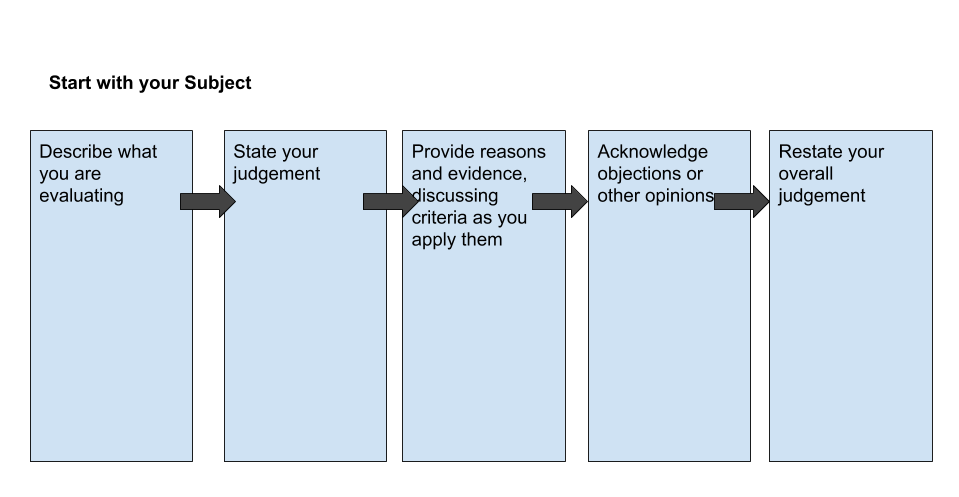
Step 4: Drafting
Now that you’ve watched the thing, written the notes, and collected your thoughts, it’s time to draft. Use the organizational scheme you created in Step 3 to help you create your evaluation.
Step 5: Get Feedback
Step 6: revising.
Once you’ve received feedback, if possible, read through it and then walk away from the work for a little while. This will allow your brain time to process the feedback you received making it much easier to sit back down to make adjustments. While revising, try to avoid messing with punctuation or fixing any grammatical issues. Revision is when you focus on your ideas and make sure they are presented properly, so make sure you’ve set aside plenty of time or scheduled multiple times to go through your project.
Once you’re finished with revision—everything is well defined, claims justified, and conclusions given—it’s time to edit. This is when you correct punctuation and adjust grammatical issues. During this stage, try to only focus on one or two issues at a time. Work all the way through your project looking for these two things, and then start again with the next couple of issues you may need to smooth.
Hopefully, you’ve finished all of these steps before the deadline. If you are running behind, make sure you reach out to your instructor to let them know; they may have some tips to help get you through the final push.
ATTRIBUTIONS AND LICENSE

“ The Evaluation Essay ” by Rachael Reynolds is licensed under a Creative Commons Attribution-NonCommercial-ShareAlike 4.0 International License and adapted work from the source below:
Adapted from “ Writing the Evaluation Essay ” by Sara Layton and is used according to CC BY-NC-SA 3.0.
UNM Core Writing OER Collection Copyright © 2023 by University of New Mexico is licensed under a Creative Commons Attribution 4.0 International License , except where otherwise noted.
Share This Book
Evaluation criteria for the final thesis project
Your thesis is evaluated and graded based on set criteria. These criteria have been developed by the assessors and teaching staff at Arcada, taking into account the European Qualifications Framework for education.
The evaluation of the thesis is done by the assessor along with the supervisor. The assessor writes a statement that is a complete examination of the thesis. The statement is also signed by the supervisor. The supervisor has the right to request a thesis language revision.
With regard to practice in the subject and nature of the work, the degree thesis and master thesis are evaluated as excellent (5), very good (4), good (3), satisfactory (2) or sufficient (1). The grade is justified in the statement and determined by an overall assessment on the basis of the work, the maturity exam and presentation.
Theses at Arcada UAS need to correspond to the requirements set by the European Qualifications Framework External link (EQF); level 6 for bachelor's level and level 7 for master's. At the end of this website you can find links to PDF files with evaluation criteria for both bachelor's and master's theses as tables.
Degree thesis
The evaluation level of the bachelor's degree thesis is determined by the EQF level 6, which establishes requirements on
- advanced knowledge involving a critical understanding of theories and principles
- advanced skills, demonstrating expertise and innovation
- ability to solve complex problems in a specialised professional field
Themes evaluated in bachelor's degree theses
According to Arcada's evaluation criteria for bachelor's degree theses, the following themes are evaluated, and every theme's subheading is graded on a scale of 0-5:
- You can define the research problem and its motivation
- You can formulate the aims that form the basis of your thesis
- You can identify the foundation for development or research and describe previous research and literature
- You can independently choose and formulate the appropriate method and process
- You can perform the process independently and proficiently
- You present your results in a structured manner
- You contribute to solving complex problems within your profession and you can have a reflective discussion about your results and your thesis
- You are able to communicate results and reflect on ethical issues
- You are able to address ethical issues in academic research
Master thesis
The evaluation level of the degree thesis is determined by the EQF level 7, which establishes requirements on
- highly specialised knowledge as the basis for original thinking and research
- awareness of knowledge issues in a field and at the point of contact between the different disciplines
- specialised problem-solving skills in research and innovation to develop new knowledge, new procedures or integrate knowledge from different fields
Themes evaluated in master's degree theses
According to Arcada's evaluation criteria for master's degree theses, the following themes are evaluated, and every theme's subheading is graded on a scale of 0-5:
- You can delimit and define the research problem and justify it
- You can formulate aims and objectives that create the basis for your thesis
- You can identify the basis for the development or research and describe previous research and literature
- You can independently justify an appropriate method and process.
- You can provide a sufficient sample of data
- You can carry out the process independently and skillfully.
- You present your results in a structured way
- You contribute to solving complex problems in your field and you engage in a reflective discussion of your results
- You are able to communicate and reflect on your results
- You can consider ethical issues in relation to your research
The following factors are evaluated:
- Benefit for the target group and profession or occupation
- Delimitation, object
- Positioning and connection to earlier research
- Understanding of the chosen theme (concept, theories)
- Choice of method and application of method
- Presentation and purposefulness of the work process
- Information retrieval and processing
- Presentation of results
- Evaluation and critical review of results
- Originality or innovativeness
- Independency
- Design, logical structure and necessary parts
- Readability and flow
- Source reference apparatus
- Level of transparency and objectivity
- Quality of language
- Research ethical formalities
- Ethical examination
- Sustainable development
Utlåtande över examensarbete
evaluation-template-2016
Bachelor thesis evaluation framework
Master thesis evaluation framework
Evaluation Essay
Evaluation Essay - Definition, Examples, and Writing Tips
13 min read
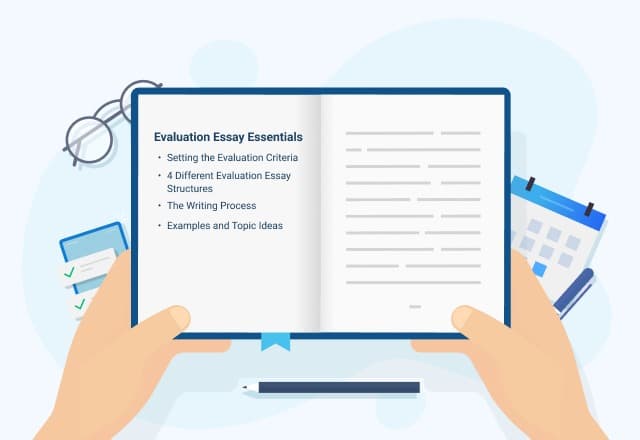
People also read
Learn How to Write an Editorial on Any Topic
Best Tips on How to Avoid Plagiarism
How to Write a Movie Review - Guide & Examples
A Complete Guide on How to Write a Summary for Students
Write Opinion Essay Like a Pro: A Detailed Guide
How to Write a Thematic Statement - Tips & Examples
How to Write a Bio - Quick Tips, Structure & Examples
How to Write a Synopsis – A Simple Format & Guide
How to Write a Comparative Essay – A Complete Guide
Visual Analysis Essay - A Writing Guide with Format & Sample
List of Common Social Issues Around the World
Writing Character Analysis - Outline, Steps, and Examples
11 Common Types of Plagiarism Explained Through Examples
Article Review Writing: A Complete Step-by-Step Guide with Examples
A Detailed Guide on How to Write a Poem Step by Step
Detailed Guide on Appendix Writing: With Tips and Examples
Are you unsure about what it takes to evaluate things from your perspective in an evaluation essay?
If you’re having a hard time understanding how to present a balanced assessment of the subject, worry not! We are here to help you get through the evaluation essay writing process.
In this blog, you will learn all about evaluation essays. From the definition, writing process, topics, tips, and a lot more, you’ll learn how to write an evaluation essay effortlessly!
Continue reading to get a better idea.
- 1. What is an Evaluation Essay?
- 2. Evaluation Essay Structure
- 3. How to Start an Evaluation Essay?
- 4. How to Write an Evaluation Essay?
- 5. How to Format Your Evaluation Essay?
- 6. Evaluation Essay Examples
- 7. Evaluation Essay Topics For College Students
- 8. Evaluation Essay vs. Review
What is an Evaluation Essay?
Let’s first understand the evaluation essay meaning, here is the standard definition:
An evaluation essay offers a value judgment or an opinion of something. It presents an overall view of a particular subject’s quality. Moreover, it provides a critical analysis and a complete evaluation of something.
What is the Purpose of an Evaluation Essay?
The main purpose of an evaluation essay is to present an opinion and evaluate a topic critically. This type of writing determines the condition, worth, or significance by careful appraisal and study.
This essay features the writer’s opinion, but when done correctly, it does not sound opinionated. Instead, it provides the facts and evidence to justify the opinions about the essay’s subject.
To write a good evaluation essay, you need to master critical evaluation and present the evaluation in an unbiased manner. You may also discuss both the pros and cons of the subject.

Paper Due? Why Suffer? That's our Job
Evaluation Essay Structure
The four different ways to format and organize the evaluation essay are as follows.
1. Chronological Structure
It is a sequential organization that could be used for evaluating historical or current events. It tells how something works and assesses the effectiveness of a mechanism, procedure, or process.
2. Spatial Structure
The spatial organization structure is used for evaluating or describing art or architecture. Here, you will define one element of the artifact and spatially move to the next.
3. Compare and Contrast Structure
The compare and contrast structure is used to evaluate or review the culinary or music genre. Here the writer evaluates a subject by comprising and contrasting it with the known subject.
4. Point-by-Point Structure
The point-by-point structure is also used for culinary and music reviews. But, in this structure, you describe one element and then evaluate it, describe the second element and evaluate it, and so on.
After setting the criteria and collecting evidence for strengthening your judgment, you’ll start your evaluation essay. Let’s see what are the steps involved in starting an evaluation essay.
How to Start an Evaluation Essay?
When you start writing an evaluation essay, grabbing the reader’s attention is essential. For this, hook the reader from the beginning until the end to ensure that your essay’s opening follows an engaging tone.
Step 1. Choose an Interesting Topic
Deciding the topic and evaluation essay criteria is important. Make sure it's not just compelling and interesting, but also informative so that you can find enough material for a detailed evaluation.
Step 2. Set the Evaluation Essay Criteria
For an evaluation essay, you have to set the criteria for evaluation first. Criteria are the standards or measures by which someone assesses the quality or value of the subject.
Some key points to establish the criteria are:
- Identifying relevant aspects that relate to the subject
- Defining the criteria clearly so that it is specific and understandable for readers
- Your criteria should be directly relevant to the nature of the subject
- Always consider the audience’s expectations and standards while setting the criteria
- Your thesis statement should always align with your evaluation criteria
Step 3. Collect Evidence for Your Judgment
The author’s judgment of the subject states whether the subject is good or bad. It is an overall assessment or the opinion supported by the evidence. The judgment corresponds to the benchmarks set by the author in the essay criteria.
The evidence is a combination of supporting data and facts. Using the evidence, the author demonstrates how well the subject meets the judgment. The evidence serves as the foundation of your evaluation.
Without providing strong and accurate evidence, you will not be able to convince the readers of your judgment.

Step 4. Decide the Essay Structure
After that, decide on the structure that you want to follow. It can be a chronological or point-by-point structure
Step 5. Craft the Essay Outline
When you create an essay outline , evaluate what should be added and removed. If you skip this step before writing, you may lose track of what to include in your essay while you write.
So, writing an outline for your evaluation essay is a critical step that eases your writing journey.
Here is a sample evaluation essay outline:
Step 6. Declare Your Thesis Statement
For an evaluation essay that keeps the reader hooked from the start, opt for a catchy thesis statement . The thesis should state the main point of the evaluation.
In the thesis statement, you should always express your stance on the subject clearly. In doing so, the readers will have a clear idea about the purpose and direction of your essay.
Now, understand how to write an evaluation essay by following the detailed procedure mentioned below.
Tough Essay Due? Hire Tough Writers!
How to Write an Evaluation Essay?
Here is a step-by-step guide for you to write an evaluation essay.
Step 1. Write the Introduction
The introduction is the first impression your readers will have of you, so it's crucial to make a good one. It should capture attention and excite readers, drawing them into what you have to say about this topic.
The following are the elements that you should consider while writing the introduction:
- Start with an interesting hook statement so that you can get the reader’s attention.
- Provide background information about the topic for the reader to understand the subject
- Establish the evaluation essay thesis statement. It sets out the overall purpose of the evaluation, so make sure it is apparent and to the point
Read this evaluation essay introduction example, and you’ll understand exactly what to pen down in yours:
Step 2. Draft the Body Section
The body of the essay consists of three paragraphs. Each paragraph holds different ideas related to one another and flows smoothly from start to finish, just like how a good story should be told.
Here are the important points that must be included in the body paragraphs.
- Start with the topic sentence that presents your judgment about the topic
- Present the supporting evidence to back up the topic sentence and your viewpoint.
- Present a balanced evaluative argument to show impartiality
- Compare and contrast the subject to another subject to show the strengths and weaknesses
- Present the evaluation from multiple perspectives, while being both positive and critical
- Always use transition words between your paragraphs to ensure a smooth and coherent flow for the reader.
Step 3. Write the Conclusion
It is the final chance to convince your reader to agree with your point of view. You’re supposed to summarize and conclude the essay. In the conclusion , you present your final evaluation of the essay.
Keep in mind the following aspects while writing a closing paragraph of an evaluation essay.
- Summarize the points and evaluative arguments that you made in the body section.
- Justify your thesis statement.
- Provide a concrete and secure conclusion to your argument by ultimately leaving the reader convinced by your evaluation.
Step 4. Proofread, Revise, and Edit
The final step is proofreading and editing. Always spend enough time reading your essay carefully. It will help you catch the unintentional mistakes you have made and recover them. If needed, you can also revise your essay 2–3 times.
How to Format Your Evaluation Essay?
For formatting your evaluation essay, follow the standard academic writing guidelines. You can opt for different formatting styles like APA, MLA, or Chicago.
In general, you should stick to the below formatting guidelines:
Font and Size:
- Use a legible font such as Times New Roman or Arial.
- Choose a standard font size, often 12-point.
- Set one-inch margins on all sides of the paper.
- Double-space the entire essay, including the title, headings, and body paragraphs.
- Create a title for your essay that reflects the subject and purpose of the evaluation.
- Center the title on the page.
- Use title case (capitalize the first letter of each major word).
- Include a header with your last name and page number in the top right corner.
- Follow the format “Last Name Page Number” (e.g., “Smith 1”).
Citations (if applicable):
- Include citations for any sources used in your evaluation.
- Follow the citation style specified by your instructor or the required style guide (APA, MLA, Chicago).
Counterargument (if included):
- Clearly label and present any counterargument.
- Provide a well-reasoned response to the counterargument.
References or Works Cited Page (if applicable):
- Include a separate page for references or a works cited page if your essay includes citations.
- List all sources in the appropriate citation style.
Well, the time has come to look at some great evaluation essay examples. Getting help from sample essays is always a great way to perfect your evaluation papers.
Evaluation Essay Examples
Evaluation can be written on any topic, i.e., book, movie, music, etc. Below, we have given some evaluation essay examples for students:
Evaluation Essay Sample PDF
Movie Evaluation Essay Example
Critical evaluation Essay Example PDF
Product Evaluation Essay PDF
Source Evaluation Essay Example PDF
Employee Self-Evaluation Essay Example
How to Start A Self-Evaluation Essay Example PDF
Evaluation Essay Topics For College Students
For writing an amazing evaluation essay, the first thing that you require is an essay topic. Here are some incredible topic ideas for college students. You can use or mold them according to your preference.
- Artificial intelligence's impact on society: A double-edged sword?
- Evaluate the online teaching and on-campus teaching styles
- Analyze and evaluate the Real Madrid football team and their performance
- Is media a threat to cultural cohesion or a source of enrichment?
- Compare and evaluate recorded music and live performance
- Evaluate how a university's football team impacts students' personalities
- Critically evaluate a remake of an original movie you have watched recently
- Analyze how the roles of females and males changed in recent romantic movies
- Evaluate your favorite restaurant, its food, aroma, and everything
- Critically evaluate gender disparities in college majors and career choices.
Evaluation Essay vs. Review
At first glance, an evaluation essay might look like a review. But, there are some notable differences between them. See this table to see how both pieces of writing differ from each other.
To conclude,
After reading the step-by-step guide and examples, you must have learned the art of writing a good evaluation essay. We’re confident that you’re now able to provide a balanced and effective evaluation of the topics you choose for your essay.
But writing a perfect essay is not that simple; you require a lot of practice and experience to become a good writer. That is why we are here to help you write any type of academic essay.
MyPerfectWords.com is a writing service that offers help for all academic writing assignments. We have a team of professional writers who are experts in writing all types of essays and evaluation papers.
So what are you waiting for? Buy custom essay online and have a sigh of relief!
Frequently Asked Questions
1. what are the four components of an evaluation essay.
The four components of an evaluation essay are:
- Introduction
- Background information
2. What are the 4 types of evaluation?
The four types of evaluation are:

Write Essay Within 60 Seconds!

Dr. Barbara is a highly experienced writer and author who holds a Ph.D. degree in public health from an Ivy League school. She has worked in the medical field for many years, conducting extensive research on various health topics. Her writing has been featured in several top-tier publications.

Paper Due? Why Suffer? That’s our Job!
Keep reading
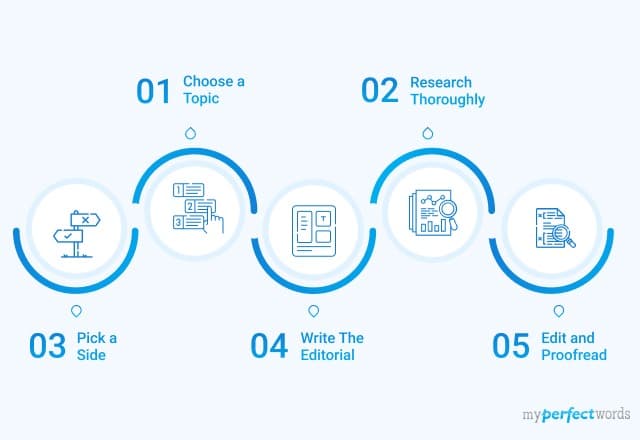

A Thesis Evaluation System
Degree type.
- Master of Science
- Computer Graphics Technology
Campus location
- West Lafayette
Advisor/Supervisor/Committee Chair
Additional committee member 2, additional committee member 3, usage metrics.
- Other engineering not elsewhere classified

45+ SAMPLE Thesis Evaluation in PDF | MS Word
Thesis evaluation | ms word, 45+ sample thesis evaluation, what is a thesis evaluation, different types of thesis evaluation, benefits of writing a thesis evaluation, basic elements of a thesis evaluation, how to write a thesis evaluation, what are some examples of thesis, what is the purpose of a thesis evaluation, what are the essential steps in writing a thesis evaluation, how to write a good thesis introduction.
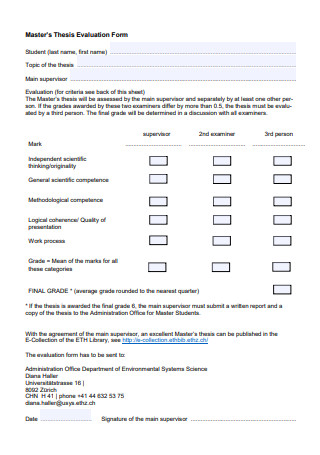
Master Thesis Written Evaluation Form
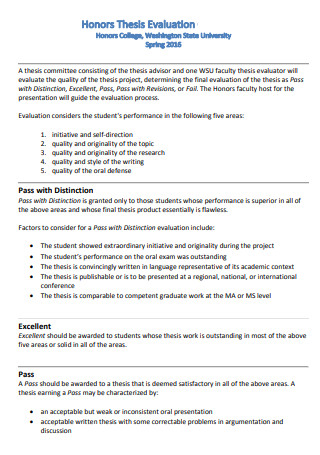
Honors Critical Thesis Evaluation
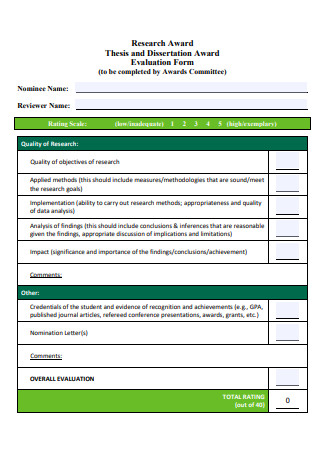
Thesis and Dissertation Award Evaluation Report Form
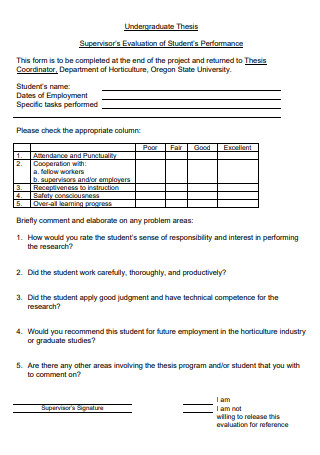
Undergraduate Thesis Supervisor Evaluation Assessment Form
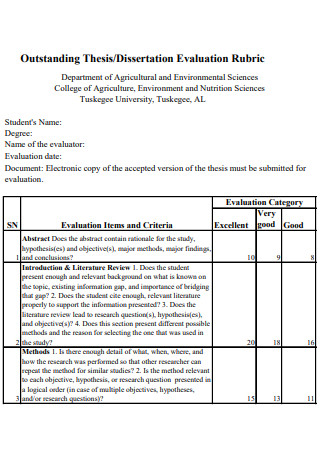
Outstanding Thesis Dissertation External Examiner Evaluation
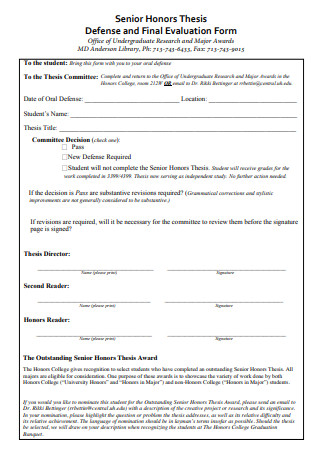
Senior Honors Thesis Defense Evaluation Criteria Form
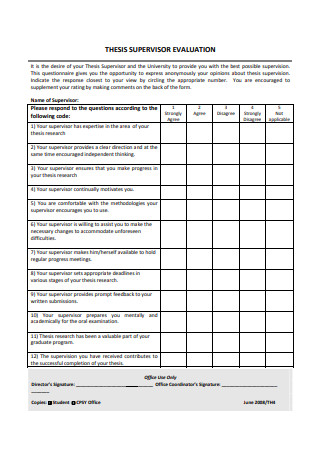
PhD Thesis Supervisor Evaluation
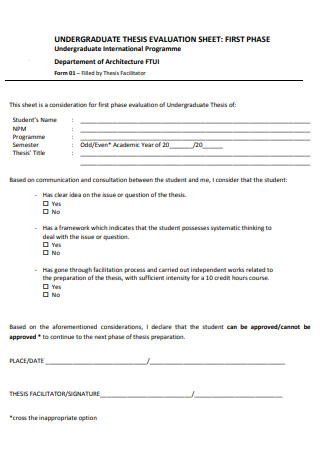
Undergraduate Thesis Evaluation Sheet
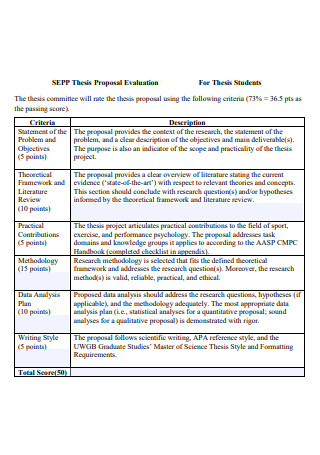
Thesis Proposal Evaluation For Students
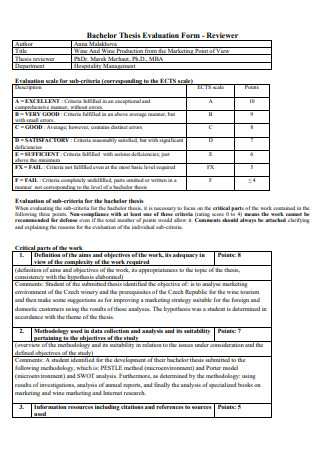
Bachelor Thesis Evaluation Form
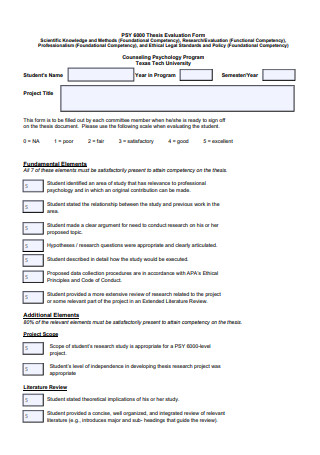
Thesis Evaluation Form
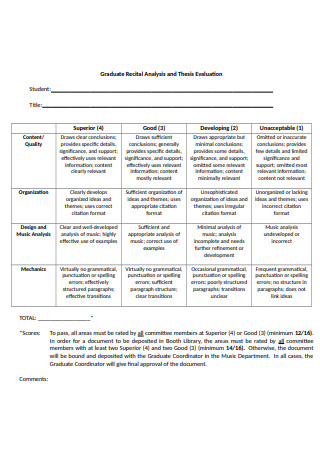
Graduate Recital Analysis and Thesis Evaluation
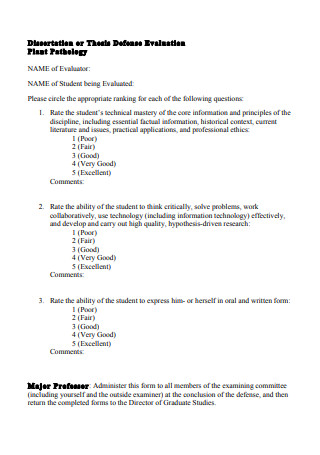
Thesis Defense Evaluation
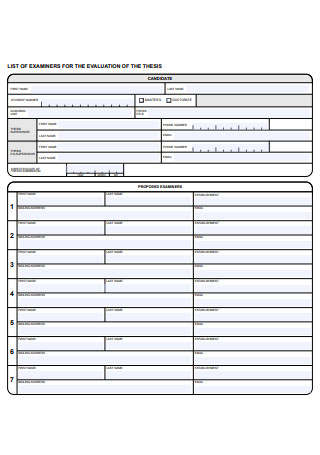
Thesis Evaluation of Examiners
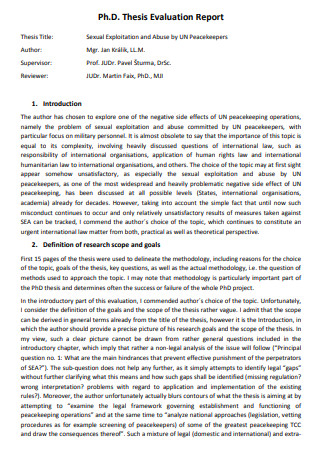
Thesis Evaluation Report
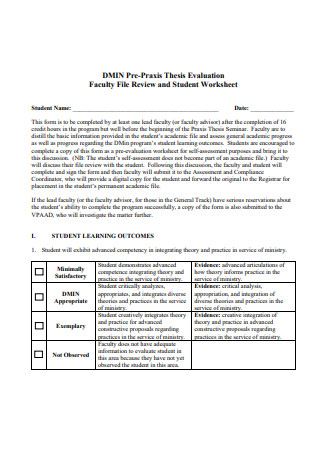
Thesis Evaluation and Student Worksheet
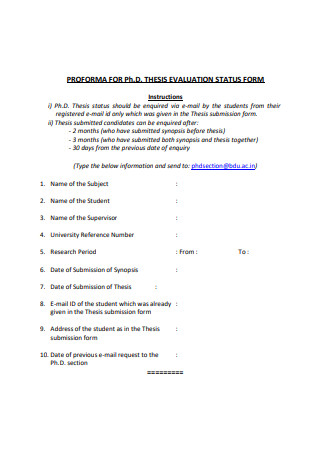
Thesis Evaluation Status Form
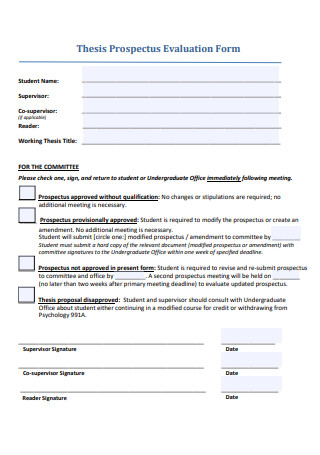
Thesis Prospectus Evaluation Form
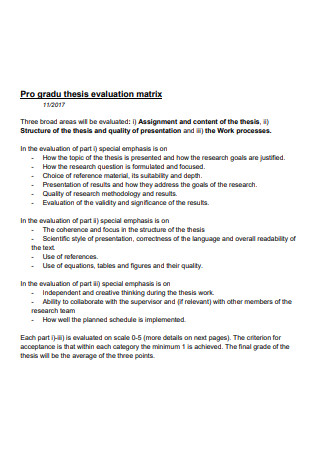
Thesis Evaluation Matrix
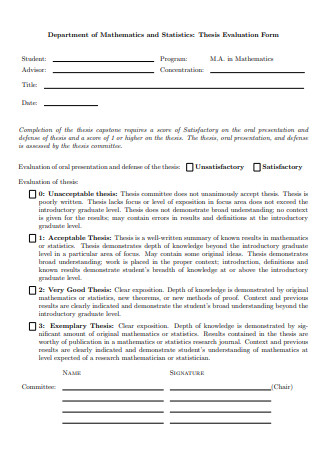
Department of Mathematics and Statistics Thesis Evaluation Form
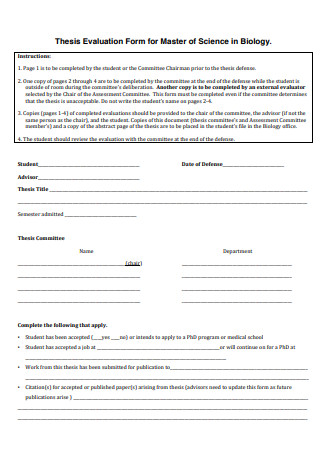
Thesis Evaluation Form For Master of Science in Biology
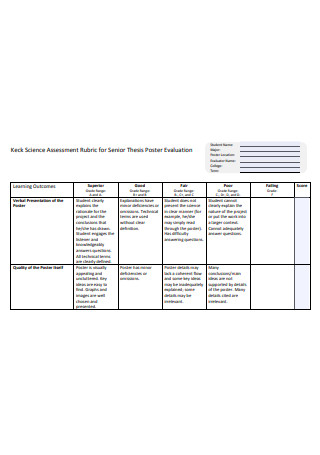
Senior Thesis Evaluation
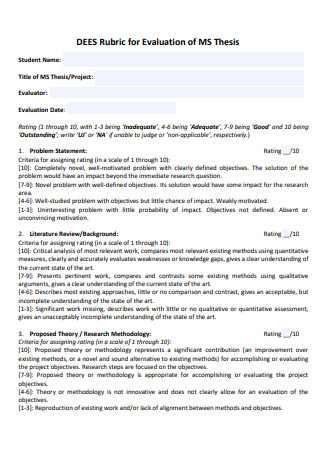
Basic Thesis Evaluation
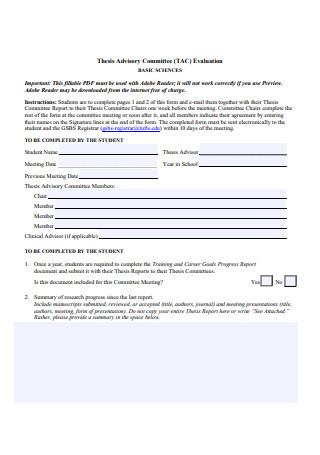
Thesis Committee Evaluation
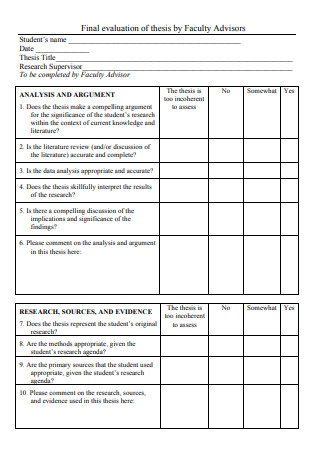
Faculty Thesis Final Evaluation
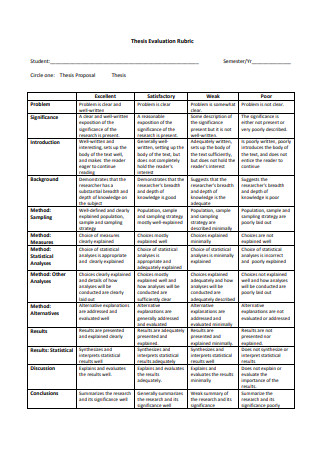
Thesis Evaluation in PDF
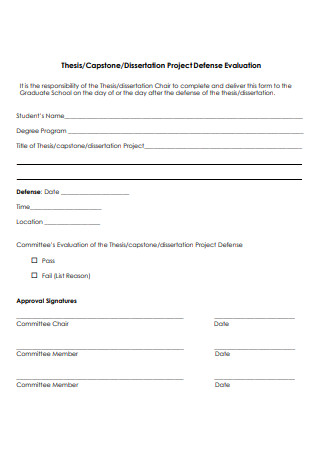
Thesis Dissertation Project Defense Evaluation
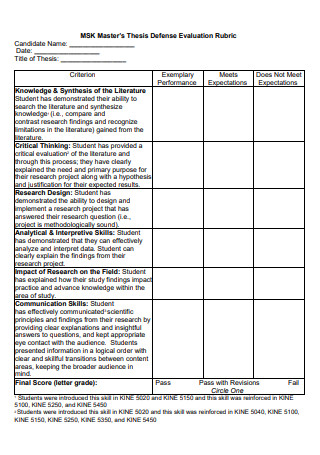
Master Thesis Defense Evaluation
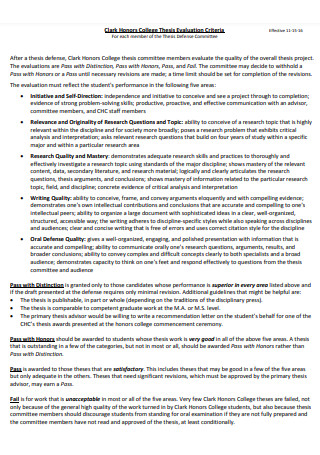
Honors College Thesis Evaluation
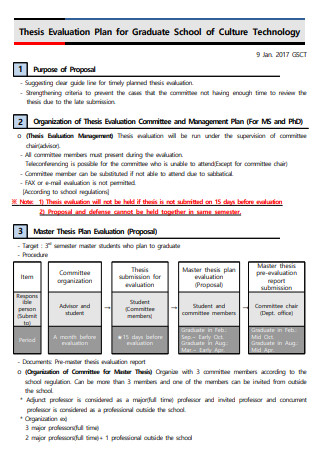
Thesis Evaluation Plan
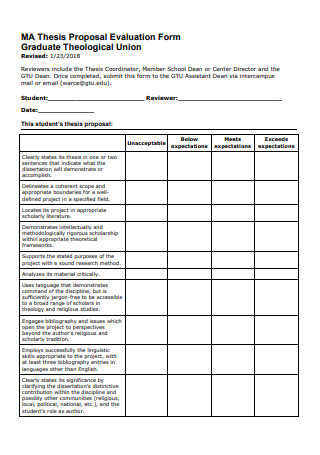
Thesis Proposal Evaluation Form
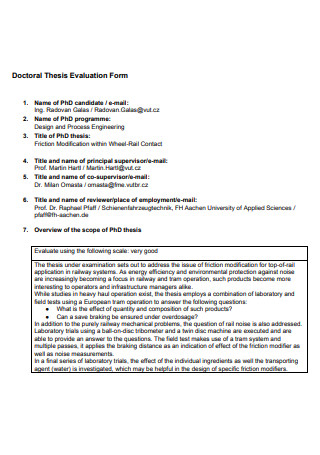
Doctoral Thesis Evaluation Form
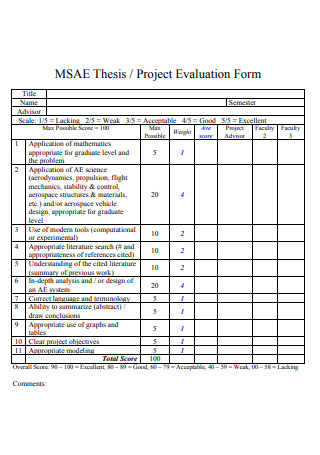
Thesis Project Evaluation Form
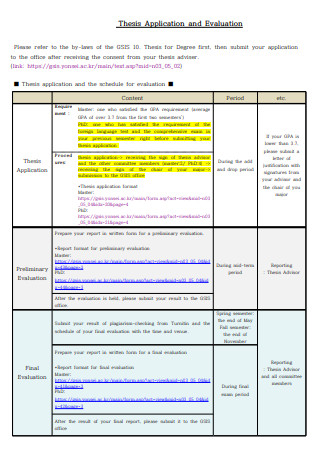
Thesis Application and Evaluation
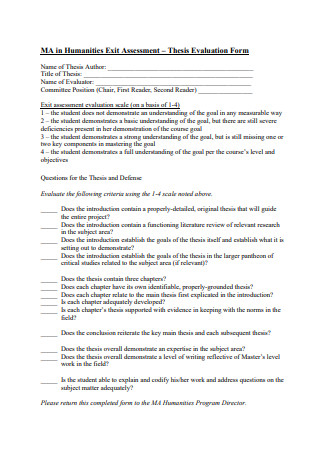
Humanities Exit Assessment Thesis Evaluation
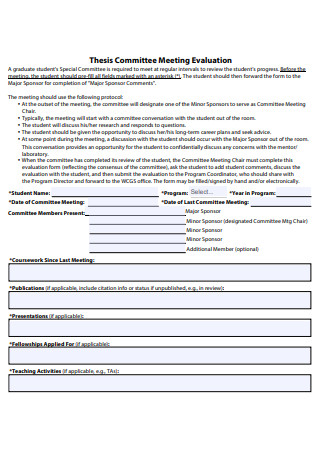
Thesis Committee Meeting Evaluation
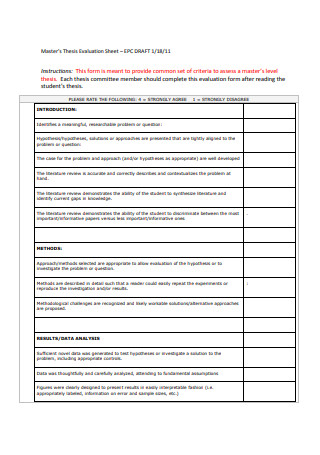
Master Thesis Evaluation Sheet
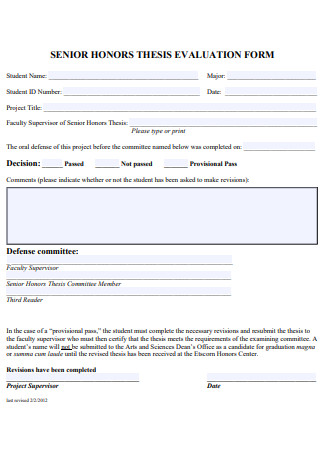
Senior Honors Thesis Evaluation Form
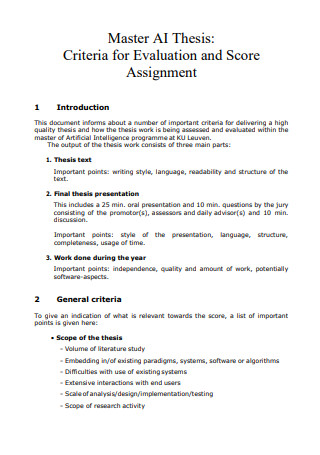
Master Thesis Evaluation and Score Assignment
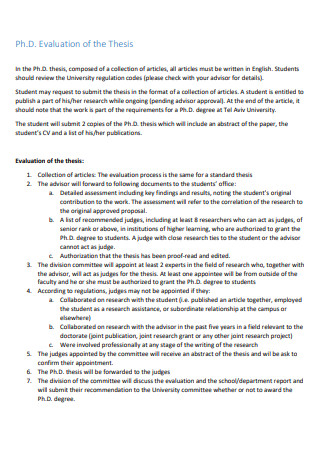
Thesis Evaluation Example
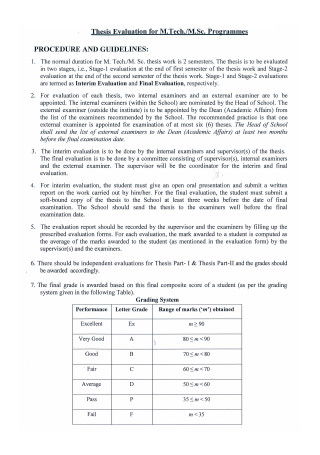
Programmes Thesis Evaluation
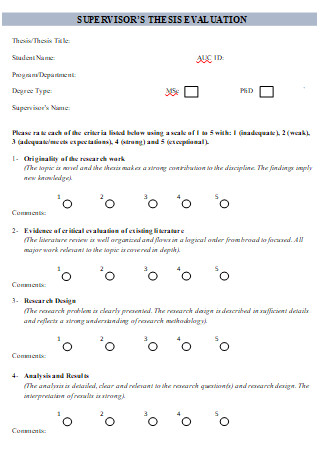
Supervisor Thesis Evaluation
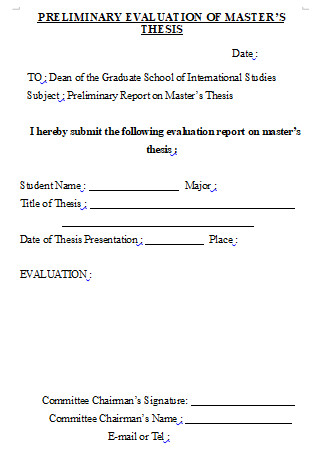
Master Thesis Preliminary Evaluation
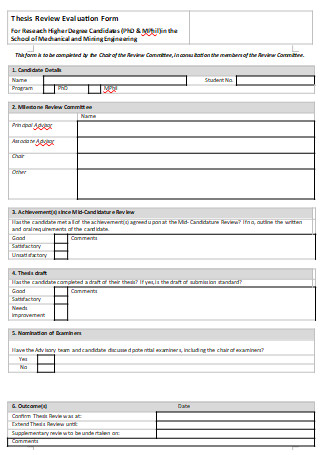
Thesis Review Evaluation Form
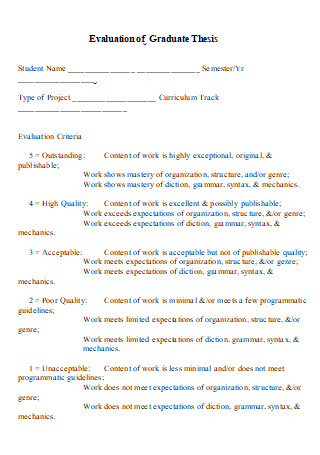
Graduate Thesis Evaluation
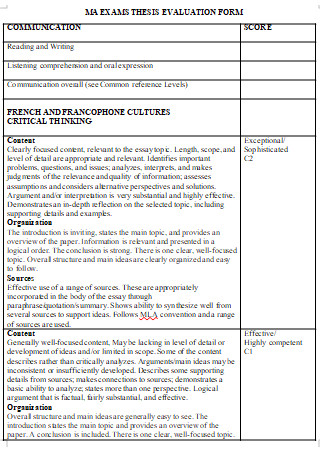
Exams Thesis Evaluation Form
1. bachelor thesis evaluation, 2. master thesis evaluation, 3. doctoral thesis evaluation, 1. maintains a clear analysis of thesis work, 2. facilitates organized decision making, 3. aims on a student’s overall performance, 4. provides summative comments , step 3: search for possible errors in a balanced way, what are some examples of thesis evaluation , share this post on your network, file formats, word templates, google docs templates, excel templates, powerpoint templates, google sheets templates, google slides templates, pdf templates, publisher templates, psd templates, indesign templates, illustrator templates, pages templates, keynote templates, numbers templates, outlook templates, you may also like these articles, 50+ sample internship evaluation in pdf | ms word.

Providing invaluable professional experience can be made through facilitating internships to potential individuals, allowing college and undergraduate students to test the concepts and theories that they learned throughout their…
39+ SAMPLE Probationary Evaluation in PDF | MS Word
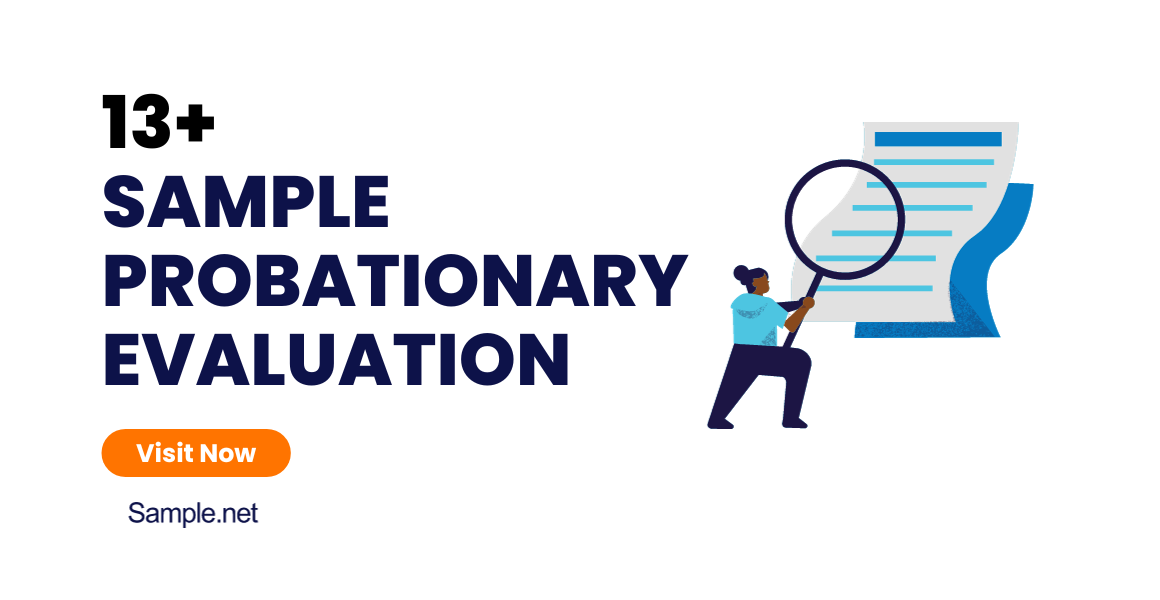
It is hard to find a job these days. There is a 5.6% unemployment rate in the US this year. Though Trade Economics has predicted that it would go…
browse by categories
- Questionnaire
- Description
- Reconciliation
- Certificate
- Spreadsheet
Information
- privacy policy
- Terms & Conditions
The top 10 thesis defense questions (+ how to prepare strong answers)
Crafting a thesis is significant, but defending it often feels like the ultimate test. While nerve-wracking, proper preparation can make it manageable. Prepare for your thesis defense with insights on the top questions you can expect, including strategies for answering convincingly.
Mastering the thesis defense: cultivate a success mindset
Question 1: why did you choose this particular topic for your research, question 2: how does your research contribute to the existing body of knowledge, question 3: what are the key findings of your research, question 4: can you defend your research methodology, question 5: how did you analyze the data and what challenges did you encounter, question 6: what theoretical frameworks or references underpin your research, question 7: how did you address ethical considerations in your research, question 8: in what ways does your research contribute to the field, question 9: how did you ensure your research was free from bias, question 10: where can future research go from here.
Nurturing a success mindset for your defense is pivotal. This means adopting a mental outlook geared towards achieving favorable outcomes during your thesis defense. To truly excel in this pivotal academic moment, it’s imperative to cultivate both confidence and composure.
Confidence enables you to present your research with conviction, while composure allows you to navigate any challenges with grace and clarity.
Remember, you know your thesis best, so trust in your expertise.
In essence, a success mindset encompasses the belief in your abilities, coupled with the ability to remain calm and focused under pressure.
Stay composed and focused, relying on your thorough preparation. If you encounter a question you can’t answer, gracefully guide the conversation back to familiar topics.
Use strategic responses when needed. For example, if a question goes beyond your thesis scope, acknowledge its relevance but steer back to your focused areas. Similarly, if you’re unfamiliar with a theory or literature, admit it but offer related insights or perspectives.
By embracing these principles and staying confident and adaptable, you’ll navigate your thesis defense with ease.
This question delves into the origins of your academic journey, aiming to understand not just what you studied, but the underlying motivations and processes that drove your exploration. It’s not merely about the superficial aspects of your research, but rather about the deeper intellectual curiosity that ignited your quest.
To effectively respond, take the opportunity to elaborate on the intricacies of your journey. Begin by unpacking the specific interests or questions that sparked your intellectual curiosity in the subject matter. What events, experiences, or influences led you to delve into this particular area of study? Providing an anecdote or example that vividly illustrates the genesis of your scholarly pursuit can be helpful.
Moreover, discuss the gaps you identified in the existing literature that motivated you to contribute to your field. What deficiencies or unanswered questions did you observe? How did these gaps inspire you to embark on your research journey with the aim of filling these voids? By articulating the specific shortcomings in the current body of knowledge, you demonstrate a nuanced understanding of your research area and underscore the significance of your work.
Additionally, highlight any personal or academic experiences that played a pivotal role in steering you towards your chosen topic. Whether it was a transformative educational experience, a profound personal interest, or a meaningful encounter, these experiences can offer valuable insights into the origins of your scholarly pursuits.
In summary, when articulating your narrative, consider the following key points:
- Unpack the specific interests or questions that sparked your intellectual curiosity.
- Discuss the gaps in the existing literature that motivated your research.
- Highlight any personal or academic experiences that influenced your choice of topic.
This question delves into the vital role your research plays within the existing body of knowledge, urging you to articulate its significance and impact. It’s not merely about the subject matter you’ve studied, but also about the unique contributions and advancements your research brings to your field. To effectively respond, delve into the intricacies of your work and its implications for the broader academic landscape.
Begin by emphasizing the novelties and breakthroughs your research introduces. Highlight specific aspects of your study that represent advancements in understanding or methodologies. Whether it’s a novel approach to a longstanding problem, the discovery of new phenomena, or the development of innovative methodologies, these contributions underscore the significance of your research within the academic community.
Next, describe how your work engages with or challenges current conversations in your field. Discuss the existing paradigms or theories your research builds upon or critiques. Articulate how your findings contribute to ongoing debates or reshape prevailing understandings. By positioning your research within the broader context of scholarly discourse, you showcase its relevance and impact on the evolving landscape of your field.
Illuminate how your findings could influence future research trajectories. Explore potential avenues for further inquiry that emerge from your research findings. Consider how your work opens up new questions or areas of exploration for future researchers. By identifying these potential research directions, you demonstrate the forward-looking nature of your work and its potential to shape the future trajectory of your field.
In summary, when addressing how your research contributes to the existing body of knowledge, consider the following key points:
- Emphasize the novelties and breakthroughs your research introduces.
- Describe the conversations in your field that your work engages with or challenges.
- Illuminate how your findings could influence future research trajectories.
Addressing the question of your research’s key findings demands skill, as it necessitates succinctly summarizing your work while conveying its significance. To effectively respond, distill your findings into digestible takeaways that encapsulate the essence of your research. Identify the central discoveries or outcomes of your study, ensuring clarity and conciseness in your presentation.
Furthermore, relate these findings to the broader implications they hold for your field. Articulate how your research contributes to advancing knowledge or addressing pressing issues within your academic discipline. Consider the potential impact of your findings on theory, practice, or policy, highlighting their relevance and significance within the larger scholarly community.
Additionally, be prepared to elucidate the nuances and complexities involved in your results. While providing a concise summary of your findings is essential, it’s equally important to acknowledge the intricacies and limitations of your research. Discuss any methodological considerations, unexpected outcomes, or areas for further investigation, demonstrating a nuanced understanding of your work.
In summary, when addressing the key findings of your research, consider the following key points:
- Distill your findings into digestible takeaways.
- Relate the outcomes to the broader implications they hold for your field.
- Be prepared to shed light on the nuances and complexities involved in your results.
Defending your research methodology entails a comprehensive understanding of its rationale, alignment with research objectives, and acknowledgment of potential limitations. It’s not merely about explaining the methods employed but also justifying why they were chosen over alternative approaches. To effectively respond, delve into the intricacies of your methodology and its implications for the study.
Begin by elucidating the reasons for selecting the chosen methodology over alternatives. Discuss the specific advantages or suitability of the selected approach in addressing the research questions or objectives. Consider factors such as feasibility, appropriateness for the research context, and compatibility with the theoretical framework guiding your study.
Furthermore, explain how your chosen methods align with your research objectives. Articulate how the selected methodology enables you to achieve the intended outcomes and contribute to answering the research questions. Discuss how each methodological choice supports the overall research design and furthers the overarching goals of the study.
Be prepared to discuss the limitations inherent in your chosen methodology and how you mitigated them. Acknowledge any constraints or shortcomings associated with the selected approach, such as potential biases, sample size limitations, or data collection challenges. Demonstrate your awareness of these limitations and discuss the strategies implemented to address or minimize their impact on the validity and reliability of your findings.
In summary, when defending your research methodology, consider the following key points:
- Justify the methodology with reasons for selecting it over alternatives.
- Explain the methods’ alignment with your research objectives.
- Be ready to discuss the limitations and how you mitigated them.
Addressing the intricacies of data analysis involves not only outlining the techniques employed but also navigating the challenges encountered and evaluating the reliability and validity of the interpretations drawn. When responding to inquiries about data analysis, it’s essential to provide a comprehensive understanding of the methodologies employed, the obstacles faced, and the strategies utilized to ensure the accuracy and credibility of the findings.
Begin by outlining the techniques used for data analysis. Describe the specific methods, tools, and software employed to process and interpret the data collected. Whether it involved quantitative statistical analysis, qualitative coding techniques, or a combination of both, provide insights into the analytical framework guiding your study. Additionally, discuss the rationale behind the chosen analytical approach and how it aligns with the research objectives and questions.
Next, share the hurdles faced during the data analysis process and how you overcame them. Reflect on any challenges encountered, such as data cleaning issues, missing data, or unexpected patterns in the dataset. Discuss the steps taken to address these challenges, whether through iterative refinement of analytical techniques, consultation with peers or supervisors, or adaptation of the research design. Highlighting your ability to navigate obstacles demonstrates resilience and resourcefulness in overcoming methodological challenges.
Furthermore, discuss the reliability and validity of your data interpretation. Evaluate the rigor and credibility of your analytical process, considering factors such as data integrity, consistency, and relevance to the research objectives. Discuss any measures taken to ensure the trustworthiness of the findings, such as inter-coder reliability checks, triangulation of data sources, or member checking with participants. By critically examining the reliability and validity of your data interpretation, you provide insights into the robustness of your analytical approach and the credibility of the conclusions drawn.
In summary, when addressing inquiries about data analysis, consider the following key points:
- Outline the techniques used for data analysis.
- Share the hurdles faced during the process and how you overcame them.
- Discuss the reliability and validity of your data interpretation.
Exploring the theoretical underpinnings of your research involves delving into the foundational frameworks and seminal works that informed your study’s conceptual framework and analytical approach. When responding to inquiries about theoretical frameworks , it’s essential to provide a comprehensive understanding of the theories and references that shaped your research, elucidate their influence on your hypothesis and analysis, and reflect on the potential contributions or revisions your study may offer to existing theoretical foundations.
Begin by naming the key theories and seminal works that guided your research. Identify the theoretical frameworks that provided the conceptual scaffolding for your study, as well as the seminal works that shaped your understanding of the research area. Discuss how these theories and references informed your research design, methodology, and analytical approach, providing a theoretical lens through which to interpret your findings.
Elucidate on how these frameworks shaped your hypothesis and analysis. Describe how the theoretical perspectives and insights gleaned from seminal works informed the development of your research questions, hypotheses, and analytical framework. Discuss the ways in which these theoretical frameworks guided your data collection and interpretation, influencing the selection of variables, measures, and analytical techniques employed in your study.
Reflect on how your research may contribute to or revise these theoretical foundations. Consider the implications of your findings for advancing existing theoretical frameworks or revising established paradigms within your field. Discuss how your research extends or challenges current theoretical perspectives, offering new insights, conceptual refinements, or empirical evidence that may enrich or reshape prevailing theories. By critically examining the relationship between your research and existing theoretical frameworks, you provide insights into the broader theoretical implications and contributions of your study.
In summary, when addressing inquiries about theoretical frameworks, consider the following key points:
- Name the key theories and seminal works that guided your research.
- Elucidate on how these frameworks shaped your hypothesis and analysis.
- Reflect on how your research may contribute to or revise these theoretical foundations.
When addressing ethical considerations in your research, it’s essential to demonstrate a commitment to upholding ethical standards and protecting the rights and well-being of participants. Responding to inquiries about ethical protocols involves explaining the steps taken to ensure ethical conduct throughout the research process, describing the consent process and data protection measures implemented, and mentioning any institutional review board (IRB) approvals obtained.
Begin by explaining the ethical protocols you followed. Detail the ethical guidelines, codes of conduct, or regulatory frameworks that informed your research design and conduct. Discuss how these guidelines influenced decisions regarding participant recruitment, data collection methods, confidentiality protocols, and data storage procedures, emphasizing your adherence to ethical principles throughout the research process.
Describe the consent process, if applicable, and how you protected participants’ data. Provide insights into how informed consent was obtained from participants, including the procedures used to inform participants about the research purpose, risks, benefits, and their rights. Discuss any measures taken to safeguard participants’ privacy and confidentiality, such as anonymizing data, securing data storage, and limiting access to sensitive information, ensuring the protection of participants’ identities and personal information.
Mention any institutional ethics review board approvals you obtained. Highlight any formal ethical review processes or approvals obtained from relevant regulatory bodies, such as IRBs or ethics committees. Discuss how the research protocol was reviewed for compliance with ethical guidelines and standards, including considerations of participant welfare, informed consent procedures, and data protection measures. By acknowledging the oversight and approval of institutional review bodies, you demonstrate your commitment to ethical integrity and accountability in conducting research involving human subjects.
In summary, when addressing inquiries about ethical considerations in your research, consider the following key points:
- Explain the ethical protocols you followed.
- Describe the consent process and data protection measures implemented.
- Mention any institutional ethics review board approvals obtained.
When discussing the contributions of your research to the field, it’s essential to highlight the novel insights and potential impact your thesis offers. Responding to inquiries about your research’s significance involves detailing the unique perspectives and fresh understanding it brings to the academic discourse, as well as considering its implications for future research or practice and arguing its relevance within the broader academic community.
Begin by detailing the novel insights your thesis provides. Articulate the key findings, discoveries, or perspectives that distinguish your research from existing literature and contribute to advancing knowledge within your field. Discuss how your study fills gaps in current understanding, challenges established assumptions, or offers innovative approaches to addressing pressing issues, highlighting its potential to generate new avenues of inquiry and broaden the scope of scholarly discourse.
Discuss how your findings might influence future research or practice. Consider the implications of your research for shaping future scholarship, informing policy decisions, or guiding professional practice within relevant domains. Reflect on the potential practical applications, theoretical advancements, or methodological innovations stemming from your findings, highlighting their significance for advancing the field and addressing real-world challenges.
Be prepared to argue the relevance of your research within the broader academic community. Articulate the broader significance of your study within the context of current debates, trends, or priorities within your discipline. Discuss how your research aligns with existing scholarly agendas, contributes to interdisciplinary dialogue, or addresses pressing societal concerns, underscoring its relevance and potential impact on shaping the direction of future research and practice.
In summary, when addressing inquiries about the contributions of your research to the field, consider the following key points:
- Detail the novel insights your thesis provides.
- Discuss how your findings might influence future research or practice.
- Be prepared to argue the relevance of your research within the broader academic community.
When ensuring the integrity of your research and minimizing bias, it’s crucial to maintain objectivity and rigor throughout the study. Responding to inquiries about bias involves discussing the steps taken to uphold objectivity, describing any blind or double-blind procedures employed, and acknowledging and mitigating any unavoidable biases that may have arisen during the research process.
Begin by discussing the steps taken to maintain objectivity and rigor. Detail the strategies implemented to minimize the influence of personal biases, preconceptions, or external factors on the research outcomes. This may include adhering to a predetermined research protocol, using standardized procedures for data collection and analysis, and engaging in peer review or validation processes to ensure the reliability and validity of the findings.
Describe any blind or double-blind procedures employed in the study. Explain how blinding techniques were used to prevent bias in data collection, analysis, or interpretation. This may involve withholding certain information from researchers or participants to minimize the potential for conscious or unconscious bias to influence the results. Discuss how these procedures were implemented and their impact on enhancing the credibility and impartiality of the research outcomes.
Acknowledge any unavoidable biases that may have emerged during the research process and discuss how they were mitigated. Reflect on the inherent limitations or sources of bias in the study design, data collection methods, or participant selection criteria. Discuss the steps taken to minimize the impact of these biases, such as conducting sensitivity analyses, controlling for confounding variables, or triangulating data sources to corroborate findings.
In summary, when addressing inquiries about bias in your research, consider the following key points:
- Discuss steps taken to maintain objectivity and rigor.
- Describe any blind or double-blind procedures employed.
- Acknowledge any unavoidable biases and discuss how they were mitigated.
When considering the potential trajectory of your research topic, it’s essential to identify areas where further investigation could yield valuable insights, discuss unexplored questions that emerged from your research, and reflect on the limitations of your study as starting points for future research endeavors. Responding to inquiries about the future direction of research involves suggesting fruitful areas for further investigation, highlighting unresolved questions, and leveraging the limitations of your study as opportunities for future exploration.
Begin by suggesting areas where further investigation could be fruitful. Identify specific gaps, ambiguities, or unanswered questions within the existing literature that warrant additional inquiry. Consider emerging trends, advancements in technology or methodology, or pressing societal issues that may inform potential research directions. Propose research topics or hypotheses that build upon the findings of your study and extend the boundaries of current knowledge within your field.
Discuss unexplored questions that arose from your research. Reflect on any unexpected findings, anomalies, or areas of ambiguity that emerged during the course of your study. Consider how these unanswered questions or unresolved issues could serve as catalysts for future research endeavors, prompting further investigation into related phenomena, alternative explanations, or novel research methodologies.
Reflect on the limitations of your study as starting points for future research. Acknowledge any constraints, biases, or methodological shortcomings that may have influenced the outcomes or interpretations of your study. Discuss how these limitations provide opportunities for future research to refine methodologies, address confounding variables, or explore alternative theoretical frameworks. Consider how addressing these limitations could enhance the validity, reliability, and generalizability of future research findings within your field.
In summary, when addressing inquiries about the potential trajectory of your research topic, consider the following key points:
- Suggest areas where further investigation could be fruitful.
- Discuss unexplored questions that arose from your research.
- Reflect on the limitations of your study as starting points for future research.
Master Academia
Get new content delivered directly to your inbox.
Subscribe and receive Master Academia's quarterly newsletter.
How to harness theoretical and conceptual frameworks for groundbreaking research
25 short graduation quotes: inspiration in four words or less, related articles.
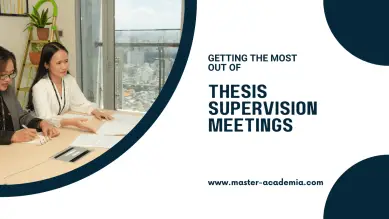
Getting the most out of thesis supervision meetings

75 linking words for academic writing (+examples)

How to write a fantastic thesis introduction (+15 examples)

Why you cannot write a PhD thesis in 3-6 months
What is a thesis? Key components of a thesis

Derived from the Greek word, “thesis” means “putting forward”. Thesis plays a vital role in completing a degree. For students planning to study abroad, it is crucial to understand what a thesis is.
As per diverse institutions and educational systems, the thesis obtains different meanings. For the British education system , the word thesis means the longest piece of writing that is completed at the end of a PhD. It often expresses the writer’s exceptional research and analyses.
For the US and other educational systems , the word thesis signifies the content created as the final step of one’s master’s and bachelor’s degrees .
Regardless of the educational system , the meaning of a thesis is a writing document that allows students to choose a topic and include research. It is important for them to conduct thorough research based on their chosen topic.
As you know the meaning of thesis, let’s understand ‘what is a thesis paper?’, ‘what is a college thesis?’ and ‘What does a thesis consist of?
What is a thesis paper? Understand its meaning!
A thesis paper is a type of document that is based on your original research. It is generally completed by students in the last year of a degree program, on a chosen topic.
The thesis paper is the longest piece of writing that expresses the topic. It depends on the students’ capability of how they do research, choose a relevant topic, create a proposal, gather data, establish a strong analysis, generate impactful conclusions and write a precise, clear and well-defined thesis.
A thesis is generally found at the end of the introduction of a thesis paper. In all research papers, it’s important to include a strong, concise thesis to grab the attention of readers.
Now, read ahead to know ‘what is a college thesis?’
Understanding a college thesis
A college thesis is a type of research project that students need to generate in their last year of graduation. Generally, students have to choose a topic they studied.
After choosing a topic, they need to share it with an advisor. Then, students can begin their research about the selected topic and start writing after the meeting with an advisor. Later, when they complete their thesis paper, college lecturers check it and decide if the paper is accurate and has all the required points and instructions for graduating from school.
Key components of a thesis
Now, you may ask ‘What does a thesis consist of?’ So, here are some major components that a thesis consists of, which include:
- Introduction
- Literature Review
- Methodology
- Discussion and Conclusion
We hope that now you know the answer to the question ‘What is thesis?’. A thesis usually expresses the chosen topic in a structured way, providing thorough research.
So, to write a clear and precise thesis, you must determine your thesis topic, do thorough research, create a draft, check the structure, and edit and proofread your paper, to ensure your final project is accurate.
For any assistance, connect with Edvoy . The expert team will help you get answers to all your queries.

Study Abroad Expert
Disclaimer: The views and opinions shared in this site solely belong to the individual authors and do not necessarily represent t ...Read More

What is a gap certificate? How to apply and its benefits

Post graduate work permit (PGWP) in Canada: Detailed guide

What is a diploma course? Different types and job prospects

Computer Science vs Software Engineering: Know the key differences

What is study permit? How to apply, differences between study permit and student visa

OFC Appointment for US Visa 2024
- News and Events
- What People Are Saying
- Introduction
- Food for Thought Blog
- Disruptive Innovation
- Getting Started
- Liberating Structures Menu
- Microstructures & Design Elements
- 1. 1-2-4-All
- 2. Impromptu Networking
- 3. Nine Whys
- 4. Wicked Questions
- 5. Appreciative Interviews (AI)
- 7. 15% Solutions
- 8. Troika Consulting
- 9. What, So What, Now What? W³
- 10. Discovery & Action Dialogue (DAD)
- 11. Shift & Share
- 12. 25/10 Crowd Sourcing
- 13. Wise Crowds
- 14. Min Specs
- 15. Improv Prototyping
- 16. Helping Heuristics
- 17. Conversation Café
- 18. Users Experience Fishbowl
- 19. Heard, Seen, Respected (HSR)
- 20. Drawing Together
- 21. Design StoryBoards
- 22. Celebrity Interview
- 23. Social Network Webbing
- 24. What I Need From You (WINFY)
- 25. Open Space Technology
- 26. Generative Relationships STAR
- 27. Agreement-Certainty Matrix
- 28. Simple Ethnography
- 29. Integrated~Autonomy
- 30. Critical Uncertainties
- 31. Ecocycle Planning
- 32. Panarchy
- 33. Purpose-To-Practice (P2P)
- Field Stories Overview
- Individual Transformations
- Business Turnaround
- Superbug Prevention
- Artful Passage of Senate Bill 29
- Academic Leadership
- Liberating the Courts & Child Welfare Law
- Army After-Action-Reviews in a Fishbowl
- Inventing the Future of Healthcare
- Marisa’s Rehearsal for Real Life as a Nurse
- Straight Up Business: Setter, Not the Spiker
- Getting Out of the In-Formation IT Department
- LS: Innovating by Including & Unleashing Everyone
- Novices to Expert Innovators in Biology
- Inclusive High-Stakes Decision Making Made Easy
- Health Care
- Infection Control
- About Keith McCandless
- Consulting Partners
- Marquee Projects
- Presentations
- Gallery & Aesthetics
- About Henri Lipmanowicz
- User Group Startup
- User/Facilitator Map
- LS in Development
- Helping Others Get Started
- Beyond Getting Started
- Schedule Time
- Ask Questions
Liberating Structures
- Field Stories
- Keith McCandless
- Henri Lipmanowicz
- User Resources
Introduction Preview the LS book here. Color and B&W versions available on Amazon. Translations available in eight languages. Learn how simple rules can unleash a culture of innovation.
When you feel included and engaged, do you do a better job? Do you think teams in which people work well together produce much better results? Have you noticed the best ideas often come from unexpected sources? Do you want to work at the top of your intelligence and give the same opportunity to others?
If YES, we have found this is the kind of organization and community that people want to be part of. AND, Liberating Structures help make it happen.
So why is it that so many organizations of all stripes are filled with disengaged workers, dysfunctional groups and wasted ideas?
While there will always be some justification for blaming leaders (or professors and administrators in education), the more compelling and useful explanation is not that people involved are bad, stupid or incompetent, but rather that the practices they have all learned are neither adapted to today’s realities nor designed to achieve the ideals listed above.
Unwittingly, the conventional structures used to organize how people routinely work together stifle inclusion and engagement.
Liberating Structures start with something so simple and essential as not to seem worth doing and end with something so powerful and profound that it hardly seems possible.
Liberating Structures used routinely make it possible to build the kind of organization that everybody wants. They are designed to include everyone in shaping next steps.
Liberating Structures introduce tiny shifts in the way we meet, plan, decide and relate to one another. They put the innovative power once reserved for experts only in hands of everyone.
Every person interested in leading change—in schools, hospitals, foundations, agencies, and businesses—can use Liberating Structures to generate innovation and great results.
Liberating Structures are easy-to-learn microstructures that enhance relational coordination and trust. They quickly foster lively participation in groups of any size, making it possible to truly include and unleash everyone. Liberating Structures are a disruptive innovation that can replace more controlling or constraining approaches.
Click on any Liberating Structure below.
Leaders know that they would greatly increase productivity and innovation if only they could get everyone fully engaged. The challenge is how. Liberating Structures are novel, practical and no-nonsense methods to help you accomplish this goal with groups of any size.
By design, Liberating Structures distribute control so that participants can shape direction themselves as the action unfolds.
Learning Events
Check out News and Events for more immersion workshops and LS User Group meetings. Subscribe to LS News & get access to archives here .
Liberating Structures are immeasurably practical. Our world is increasingly complex, interdependent, and culturally diverse. Many of our most pressing challenges cut across geographic, cultural, and technical boundaries. Simple methods that help us work together productively are central to making progress.
Helpful Analogies
Like Wikipedia , LS create simple rules to guide and liberate everyone’s contributions. Wikipedia’s must-dos and must-not dos specify how anyone can write articles, edit content, reach consensus about the facts, and share with attribution. This structure makes it possible for a diverse community to generate and sustain accurate content that compares favorably with professionally edited encyclopedias. Like Wikipedia , LS is a disruptive innovation in regard to how we engage people in organizations.
Like improv jazz , LS sparks freedom that arises from shared understanding of simple rules. Great jazz comes from playing creatively within the context of melodic and harmonic structure. Like water in a river , LS takes the shape of the banks that it touches: adapting a similar pattern at every scale and in each local setting.
Below: watch this inspired video by Professor Arvind Singhal talking about liberating education and the role of changemakers. UnScripTED: Liberating Structures
Read this practical article "Tiny Tweaks That Help You Use LS" by Barry Overeem.
Simple Ways to Engage Everyone on Zoom: Learn Several Liberating Structures in 30 minutes from Media Changemakers on Vimeo .
Unscripted #2 Liberating Structures with Dr. Arvind Singhal from Media Changemakers on Vimeo .
Lisa Gill is a fabulous writer and top drawer interviewer. Her Leadersmorphosis series dives deeply into self organizing @ work. Put your ear to this interivew she conducts with Henri and Keith.
Below, enjoy scenes from the LCJP Restorative Justice Summit. Liberating Structures were used to organize a three day event full of learning, designed to advance the Restorative Justice movement. Restorative Justice (RJ) aims to create communities in which people feel safe by carefully structuring opportunities for offenders to make amends and victims to regain their personal power. Restorative Justice practitioners found Liberating Structures to be highly structured, liberating better than expected results.
2012 CO RJ Summit Video from LCJP on Vimeo .
LS were used to design the Transformation of Nursing summit . Coalitions from all 50 states and DC came together to advance the cause.
For the United Nations ITC-ILO, Henri and Keith offered a Liberating Structures immersion workshop and follow-up consulting sessions. (The Centre is in Turin Italy.) The focus was how to organize for promoting decent work and sustainable development by not over-helping but rather facilitating networked self-organization.
Ten Principles
While the individual LS microstructures are powerful separately, they function as an interrelated set which can transform an entire organization. The LS repertoire is inspired by ten liberating principles.
When we decide we belong together, LS principles help to guide behavior and leadership actions. Detailed descriptions here.
The Surprising Power of Liberating Structures book! Preview and buy on Amazon . The color paperback ($49.95 USD), black&white ($19.95 USD) and e-book are now available on the Amazon website. Amazon offers deep discounts and free shipping to some customers.
The development team at Holisticon is happy to announce that the Liberating Structures App is now available in the Google Play and Apple App Stores . A deep bow to their creative genius. Happy downloading!
Audio: A very playful Brave New Work podcast with Aaron Dignan and Rodney Evans. On Liberating Structures with Lorenz Sell of Sutra and Keith. Lorenz asks the deepest questions about collective intelligence, generativity, and complexity science. (50 minutes) Coaching Zone Podcast with Keith and Dr. Krister Lowe. The focus is on how leaders and teams can develop more productive habits with LS. [45 minutes] Radio Interview with Meisha Rouser , organizational psychologist. The focus is on groups working at the top of their intelligence and imagination. And a third podcast interview with Amiel Handelsman that dips into specific LS microstructures and their use by groups to generate innovative cultures. [60 minutes].
Check out Falling Off the Horse while faciliating & leading with Liberating Structures. This article by Keith McCandless describes a personal path forward. It includes what is possible to stop doing when LS is integrated into your practice.
LS are inspired by complexity science. Listen to this entertaining RadioLab program on Emergence to learn about some of the underlying concept of complexity science.
LS User Groups (inventing and enlivening a new way to organize)
Open Letter from a Grateful Student to All Educators
Below: early LS users and co-developers in Latin America, Europe, Canada and the USA.

- Latest Additions
- For Cardiff Authors
- User Area Login
- How to Add Research
- Your Research Thesis
A ‘new diplomatic history’ of Anglo-Japanese relations: An evaluation of British state, minor state and non-state actors, and their interactions with Japan, 1853-1902
Anglo-Japanese relations in the nineteenth century were far more complex and multilateral than previously implied. British diplomacy was not orchestrated and unilaterally controlled by a few high-ranking officials alone, but was in reality a collective development by a wide array of actors great and small. These actors all contributed to Japan’s overall evolution from a colonised power to a formal ally in the eyes of Britain. The purpose of this thesis is to explore some of those actors’ actions and intentions, particularly those that have been largely overlooked or forgotten in previous historical studies. This thesis demonstrates how hundreds of individuals collectively contributed to the evolution of Anglo-Japanese relations. To achieve this, the thesis uses approaches and methodologies from New Diplomatic History to provide a broad coverage of various British state and non-state actors dealing with Japan during the nineteenth century, from the involvement of Parliament, the press, the Consular and Diplomatic Services, and the Royal Navy, to foreign and independent diplomatic actors hired ad hoc into Britain’s employ.
Cited times time in Google Scholar . View in Google Scholar
Cited times time in Web of Science . View in Web of Science .
Actions (repository staff only)

Downloads per month over past year
View more statistics
- 1.1 Etymology
- 1.2 Pronunciation
- 1.3.1 Derived terms
- 1.3.2 Related terms
- 1.3.3 Translations
- 1.4 References
- 1.5 Further reading
- 1.6 Anagrams
- 2.1 Etymology
- 2.2 Pronunciation
- 3.1 Etymology
- 3.2 Pronunciation
- 3.3.1 Declension
- 3.3.2 Descendants
- 3.4 References
English [ edit ]
Etymology [ edit ].
From Late Middle English thesis ( “ lowering of the voice ” ) [1] and also borrowed directly from its etymon Latin thesis ( “ proposition, thesis; lowering of the voice ” ) , from Ancient Greek θέσῐς ( thésis , “ arrangement, placement, setting; conclusion, position, thesis; lowering of the voice ” ) , from τῐ́θημῐ ( títhēmi , “ to place, put, set; to put down in writing; to consider as, regard ” ) [2] [3] (ultimately from Proto-Indo-European *dʰeh₁- ( “ to do; to place, put ” ) ) + -σῐς ( -sis , suffix forming abstract nouns or nouns of action, process, or result ) . The English word is a doublet of deed .
Sense 1.1 (“proposition or statement supported by arguments”) is adopted from antithesis . [2] Sense 1.4 (“initial stage of reasoning”) was first used by the German philosopher Johann Gottlieb Fichte (1762–1814), and later applied to the dialectical method of his countryman, the philosopher Georg Wilhelm Friedrich Hegel (1770–1831).
The plural form theses is borrowed from Latin thesēs , from Ancient Greek θέσεις ( théseis ) .
Pronunciation [ edit ]
- ( Received Pronunciation ) IPA ( key ) : /ˈθiːsɪs/ , ( archaic ) /ˈθɛsɪs/
- ( General American ) IPA ( key ) : /ˈθisɪs/
- Rhymes: -iːsɪs
- Hyphenation: the‧sis
- ( Received Pronunciation ) IPA ( key ) : /ˈθiːsiːz/
- ( General American ) IPA ( key ) : /ˈθisiz/
- Rhymes: -iːsiːz
- Hyphenation: the‧ses
Noun [ edit ]
thesis ( plural theses )
- ( rhetoric ) A proposition or statement supported by arguments .
- 1766 , [ Oliver Goldsmith ], “The Conclusion”, in The Vicar of Wakefield: [ … ] , volume II, Salisbury, Wiltshire: [ … ] B. Collins, for F [ rancis ] Newbery , [ … ] , →OCLC ; reprinted London: Elliot Stock , 1885 , →OCLC , pages 218–219 : I told them of the grave, becoming, and ſublime deportment they ſhould aſſume upon this myſtical occaſion, and read them two homilies and a theſis of my own compoſing, in order to prepare them.
- ( mathematics , computer science ) A conjecture , especially one too vague to be formally stated or verified but useful as a working convention.
- ( logic ) An affirmation , or distinction from a supposition or hypothesis .
- ( philosophy ) In the dialectical method of Georg Wilhelm Friedrich Hegel : the initial stage of reasoning where a formal statement of a point is developed ; this is followed by antithesis and synthesis .
- ( music , prosody , originally ) The action of lowering the hand or bringing down the foot when indicating a rhythm ; hence, an accented part of a measure of music or verse indicated by this action; an ictus , a stress . Antonym: arsis
- ( music , prosody , with a reversal of meaning ) A depression of the voice when pronouncing a syllables of a word ; hence, the unstressed part of the metrical foot of a verse upon which such a depression falls , or an unaccented musical note .
Derived terms [ edit ]
- all but thesis
- bachelor's thesis
- Church-Turing thesis
- conflict thesis
- doctoral thesis
- graduate thesis
- Habakkuk thesis
- master's thesis
- Merton thesis
- private language thesis
- thesis defense
- thesis film
- thesis statement
Related terms [ edit ]
Translations [ edit ], references [ edit ].
- ^ “ thē̆sis, n. ”, in MED Online , Ann Arbor, Mich.: University of Michigan , 2007 .
- ^ “ thesis, n. ”, in Lexico , Dictionary.com ; Oxford University Press , 2019–2022 .
Further reading [ edit ]
- “ thesis ”, in The Century Dictionary [ … ] , New York, N.Y.: The Century Co. , 1911 , →OCLC .
- “ thesis ”, in Webster’s Revised Unabridged Dictionary , Springfield, Mass.: G. & C. Merriam , 1913 , →OCLC .
Anagrams [ edit ]
- Heists , Sethis , heists , shiest , shites , sithes , thises
Dutch [ edit ]
From Latin thesis , from Ancient Greek θέσις ( thésis , “ a proposition, a statement, a thing laid down, thesis in rhetoric, thesis in prosody ” ) .
thesis f ( plural theses or thesissen , diminutive thesisje n )
- Dated form of these . Synonyms: dissertatie , proefschrift , scriptie
Latin [ edit ]
From Ancient Greek θέσις ( thésis , “ a proposition, a statement, a thing laid down, thesis in rhetoric, thesis in prosody ” ) .
- ( Classical Latin ) IPA ( key ) : /ˈtʰe.sis/ , [ˈt̪ʰɛs̠ɪs̠]
- ( modern Italianate Ecclesiastical ) IPA ( key ) : /ˈte.sis/ , [ˈt̪ɛːs̬is]
thesis f ( genitive thesis ) ; third declension
Declension [ edit ]
Descendants [ edit ].
- → Dutch: thesis
- → Armenian: թեզ ( tʻez )
- → Dutch: these
- → Persian: تز ( tez )
- → Romanian: teză
- → Turkish: tez
- Galician: tese
- Italian: tesi
- English: thesis
- Portuguese: tese
- Spanish: tesis
- “ thesis ”, in Charlton T. Lewis and Charles Short ( 1879 ) A Latin Dictionary , Oxford: Clarendon Press
- thesis in Gaffiot, Félix ( 1934 ) Dictionnaire illustré latin-français , Hachette.
- English terms derived from Proto-Indo-European
- English terms derived from the Proto-Indo-European root *dʰeh₁-
- English terms inherited from Middle English
- English terms derived from Middle English
- English terms borrowed from Latin
- English terms derived from Latin
- English terms derived from Ancient Greek
- English doublets
- English 2-syllable words
- English terms with IPA pronunciation
- English terms with audio links
- Rhymes:English/iːsɪs
- Rhymes:English/iːsɪs/2 syllables
- Rhymes:English/iːsiːz
- English lemmas
- English nouns
- English countable nouns
- English nouns with irregular plurals
- en:Rhetoric
- English terms with quotations
- en:Mathematics
- en:Computer science
- en:Philosophy
- English contranyms
- Dutch terms derived from Latin
- Dutch terms derived from Ancient Greek
- Dutch terms with audio links
- Dutch lemmas
- Dutch nouns
- Dutch nouns with Latin plurals
- Dutch nouns with plural in -en
- Dutch feminine nouns
- Dutch dated forms
- Latin terms derived from Proto-Indo-European
- Latin terms derived from the Proto-Indo-European root *dʰeh₁-
- Latin terms borrowed from Ancient Greek
- Latin terms derived from Ancient Greek
- Latin 2-syllable words
- Latin terms with IPA pronunciation
- Latin lemmas
- Latin nouns
- Latin third declension nouns
- Latin feminine nouns in the third declension
- Latin feminine nouns
- Word of the day archive
- English entries with language name categories using raw markup
- Mandarin terms with redundant transliterations
- Russian terms with non-redundant manual transliterations
Navigation menu

COMMENTS
thesis statement is analogous to a "movie trailer" that gives readers an engaging glimpse into the main conclusion, compelling them to read further. As research progresses and the broader
An evaluative thesis is a concise, arguable statement that expresses a judgment or assessment about a particular subject, backed by evidence and analysis. Unlike informative theses that merely inform the reader about a topic or argumentative theses that take a position on an issue, evaluative theses go further.
A good thesis has two parts. It should tell what you plan to argue, and it should "telegraph" how you plan to argue—that is, what particular support for your claim is going where in your essay. Steps in Constructing a Thesis. First, analyze your primary sources. Look for tension, interest, ambiguity, controversy, and/or complication.
A thesis is an in-depth research study that identifies a particular topic of inquiry and presents a clear argument or perspective about that topic using evidence and logic. Writing a thesis showcases your ability of critical thinking, gathering evidence, and making a compelling argument. Integral to these competencies is thorough research ...
A thesis statement . . . Makes an argumentative assertion about a topic; it states the conclusions that you have reached about your topic. Makes a promise to the reader about the scope, purpose, and direction of your paper. Is focused and specific enough to be "proven" within the boundaries of your paper. Is generally located near the end ...
Thesis. Your thesis is the central claim in your essay—your main insight or idea about your source or topic. Your thesis should appear early in an academic essay, followed by a logically constructed argument that supports this central claim. A strong thesis is arguable, which means a thoughtful reader could disagree with it and therefore ...
The evaluation of the master's thesis and the grading decision shall be based on the criteria listed in section 3. The chart presented in this guideline is designed to facilitate the supervisor's grading process. The master's thesis is an independent research project completed by the student. The supervisor shall evaluate all parts of the ...
Evaluation of a Written Thesis. Examiners are asked to evaluate the thesis in myThesis, according to the criteria in the respective thesis examiner report for a Master's or Doctoral thesis. For an example of the criteria, please see the forms: see: Master's Examiner report form; Doctoral Examiner report form (note these forms are now integrated ...
The thesis statement is the brief articulation of your paper's central argument and purpose. You might hear it referred to as simply a "thesis." Every scholarly paper should have a thesis statement, and strong thesis statements are concise, specific, and arguable. Concise means the thesis is short: perhaps one or two sentences for a shorter paper.
A thesis statement: tells the reader how you will interpret the significance of the subject matter under discussion. is a road map for the paper; in other words, it tells the reader what to expect from the rest of the paper. directly answers the question asked of you. A thesis is an interpretation of a question or subject, not the subject itself.
Step 2: Write your initial answer. After some initial research, you can formulate a tentative answer to this question. At this stage it can be simple, and it should guide the research process and writing process. The internet has had more of a positive than a negative effect on education.
The thesis is a mandatory synthesis activity that counts for 24 credits in the Master of Science (MSc) Program (45 credits). It consists in undertakinga structured and rigorous research project in a particular field that enables the student to improve her knowledge in a specific field in business. The thesis can be devoted to a
The writer's position or claim on a debatable issue is stated clearly in the thesis and expertly supported with credible researched evidence. Ideas are clearly presented in well-developed paragraphs with clear topic sentences and relate directly to the thesis. Headings and subheadings clarify organization, and appropriate transitions link ideas.
How to Do a Thesis Evaluation. A thesis is the statement telling the reader the main point or points of an essay. It makes a bold claim about the topic and then provides two or three supporting factors to demonstrate why the statement is true. When you are writing an essay, you need to spend time evaluating the thesis ...
The Master's Thesis will be assessed using the guidelines included in this document. In addition, your Master's Thesis will be assessed for completeness, consistency, accuracy, quality, scholarly writing, relevance to the educational community and completion in a timely manner. Rewriting various sections of the Master's Thesis and its ...
Thesis Statements. A thesis statement is a sentence (or sentences) that expresses the main ideas of your paper and answers the question or questions posed by your paper. It offers a quick and easy-to-follow summary of what the paper will be discussing and what you as a writer are setting out to tell them. The kind of thesis that your paper will ...
An evaluation is centered on a judgment. You can point out both its weaknesses and strengths. It is important that any judgment be balanced and fair. This is why it's important to select your criteria before starting your evaluation. Seldom is something all good or all bad, and your audience knows this.
The thesis statement is the main idea or the main argument of the essay. In an evaluation essay, the evaluative thesis statement contains the first key element: the overall judgment. One may ...
The definition problem in evaluation has been around for decades (as early as Carter, 1971), and multiple definitions of evaluation have been offered throughout the years (see Table 1 for some examples). One notable definition is provided by Scriven (1991) and later adopted by the American Evaluation Association (): "Evaluation is the systematic process to determine merit, worth, value, or ...
Degree thesis. The evaluation level of the bachelor's degree thesis is determined by the EQF level 6, which establishes requirements on. advanced knowledge involving a critical understanding of theories and principles. advanced skills, demonstrating expertise and innovation. ability to solve complex problems in a specialised professional field.
A thesis (pl.: theses), or dissertation ... The thesis must be revised extensively and undergo the evaluation and defense process again from the beginning with the same examiners. Problems may include theoretical or methodological issues. A candidate who is not recommended for the degree after the second defense must normally withdraw from the ...
The thesis should state the main point of the evaluation. In the thesis statement, you should always express your stance on the subject clearly. In doing so, the readers will have a clear idea about the purpose and direction of your essay. Now, understand how to write an evaluation essay by following the detailed procedure mentioned below.
A Thesis Evaluation System. With the development of web-based technologies, online evaluation systems have been replacing paper-based ones in various domains at a fast pace because of their many advantages such as easy administration, high efficiency, and eco-friendliness. This study aims at developing an online thesis evaluation system which ...
What is a Thesis Evaluation? A thesis evaluation is a well-defined document that presents a systematic analysis of a graduate student's thesis statement.This is a beneficial evaluation report which is written based on the diploma, graduate, master, or doctorate program policies of the graduate school, as well as the program and department that the candidate belongs to.
Crafting a thesis is significant, but defending it often feels like the ultimate test. While nerve-wracking, proper preparation can make it manageable. Prepare for your thesis defense with insights on the top questions you can expect, including strategies for answering convincingly. Contents Mastering the thesis defense: cultivate a success mindsetQuestion 1: Why did you choose
A thesis paper is a type of document that is based on your original research. It is generally completed by students in the last year of a degree program, on a chosen topic. The thesis paper is the longest piece of writing that expresses the topic. It depends on the students' capability of how they do research, choose a relevant topic, create ...
liberating structures, social invention.net, microstructures, disruptive innovation, behavior change, collaboration, social invention, diffusion of innovation ...
This thesis demonstrates how hundreds of individuals collectively contributed to the evolution of Anglo-Japanese relations. To achieve this, the thesis uses approaches and methodologies from New Diplomatic History to provide a broad coverage of various British state and non-state actors dealing with Japan during the nineteenth century, from the ...
Senses relating to logic, rhetoric, etc. (rhetoric) A proposition or statement supported by arguments. (by extension) A lengthy essay written to establish the validity of a thesis (sense 1.1), especially one submitted in order to complete the requirements for a non-doctoral degree in the US and a doctoral degree in the UK; a dissertation. 1766, [Oliver ...
Management Evaluation. Expedia finds itself in a period of transition with the recent departure of CEO Peter Kern after only 4 years. ... I will review my investment thesis as need.